Zondervan Ultimate Bible Reference Bundle (210 vols.)
Digital Logos Edition
Please note: this collection is not currently available.
For over 80 years, Zondervan has published premier Bible study resources at both the popular and academic level. This massive bundle brings together some of its most-respected series, including the NIV Application Commentary and the Expositor’s Bible Commentary. Get scholarly practical guidance on interpretation, hermeneutics and bible study from leading scholars like Gordon Fee, Douglas K. Stuart, and D.A. Carson.
Get top notch commentary on any verse and reference any word across dozens of encyclopedias and dictionaries. With this bundle, you’ll have the ultimate Bible reference library, delivering relevant insight into any biblical study you perform.
Included in this complete bundle are numerous major collections:
- The NIV Application Commentary (40 vols.)
- The New International Dictionary of New Testament Theology and Exegesis (5 vols.)
- The New International Dictionary of Old Testament Theology and Exegesis (5 vols.)
- The Expositor’s Bible Commentary (27 vols.)
- The Zondervan Encyclopedia of the Bible (5 vols.)
- Dozens of emerging Bible commentaries and theological textbooks
- Title: Zondervan Ultimate Bible Reference Bundle
- Publisher: Zondervan
- Volumes: 210
- Pages: 115,000+

Expositor’s Bible Commentary (12 vols.)
- General Editor: Frank E. Gaebelein
- Publisher: Zondervan
- Pages: 10,078
The Gold Medallion Award-winning Expositor’s Bible Commentary is a major contribution to the study and understanding of the Scriptures. Providing pastors and Bible students with a comprehensive and scholarly tool for the exposition of the Scriptures and the teaching and proclamation of their message, this 12-volume reference work has become a staple of seminary and college libraries and pastors’ studies worldwide.
The author list [of the Expositore’s Bible Commentary] reads like a page from a ‘who’s who’ of evangelical Bible scholars. A quality product. Unquestionably wise for the serious student to plan to secure each volume.
—Crux

Expositor’s Bible Commentary: Abridged (2 vols.)
- General Editor: Frank E. Gaebelein
- Publisher: Zondervan
- Pages: 2,832
An abridgment of the critically acclaimed Expositor’s Bible Commentary, this Gold Medallion-winning resource gives you in two volumes all the essential information and practical insights of the original twelve-volume set, while trimming off cumbersome technical details. Based on the critically acclaimed Expositor’s Bible Commentary used by pastors, students, and scholars across the world, this two-volume abridged edition offers you the full, penetrating, verse-by-verse commentary of the 12-volume series, while leaving out technical details. Marshalling the knowledge of fifty-two top biblical scholars, it brings tremendous insight to your Bible studies.

Expositor’s Bible Commentary, Revised Edition (13 vols.)
- General Editors: Tremper Longman III and David E. Garland
- Edition: Revised
- Publisher: Zondervan
- Volumes: 13
- Pages: 11,939
An award-winning legacy continues; completely revised and featuring world-class evangelical scholarship, the Expositor’s Bible Commentary is now available!
Since 1976 pastors, teachers, and students have turned to the EBC for content they can trust. With two million copies sold, the award-winning legacy continues in 2012 with a complete, totally revised, and updated 13-volume set. This new series contains 60% new content and provides the most recent evangelical scholarship from world-class scholars including new contributors George Guthrie, John Walton, Andrew E. Hill, Eugene H. Merrill, Andreas Köstenberger, and more.
Scholarly and accessible, The Expositor’s Bible Commentary, Revised Edition (13 vols.) is a comprehensive and succinct commentary that guides users to the text’s core meaning. With enhanced ease-of-use features, specialized discussion of key words and concepts, and each commentator’s point-of-view on the text’s implications for life, it is a vital resource for every preacher, teacher, and student of the Bible.
These writers are all-stars! The Expositor’s Bible Commentary—Revised is a valuable resource for all who teach the Scriptures.
—John Ortberg, Senior Pastor, Menlo Park Presbyterian Church
These commentaries offer an abundance of excellent scholarship from many of the most prominent and careful evangelical biblical scholars today, both older and younger.
—Craig S. Keener, Professor of New Testament, Asbury Theological Seminary
The Expositor’s Bible Commentary has been a core resource for decades with good reason: it is concise, clear, and focused on giving the key points of a book’s message. Now with this revised edition, one can continue to use this fine resource and know the discussion is up to date, utilizing all the strengths of the original.
—Darrell L. Bock, Research Professor of New Testament Studies, Dallas Theological Seminary
Every student, teacher, and pastor needs a foundational set of commentaries that covers the Bible from Genesis to Revelation. The Expositor’s Bible Commentary (13 volumes) is that set. Written from an evangelical point of view and newly revised by leading evangelical scholars, the Expositor’s Bible Commentary series provides students, teachers, and pastors with a comprehensive tool for studying and explaining the Scriptures. I have used the Expositor’s Bible Commentary over the years and look forward to using this newly revised edition for many years to come.
—Mark Futato, Robert L. Maclellan Professor of Old Testament and Academic Dean, Reformed Theological Seminary, Orlando, FL
The revised edition of the Expositor’s Bible Commentary offers students of the Scriptures quick and reliable access to the entire Bible in thirteen reader-friendly volumes. Written by the foremost evangelical scholars of our time, the commentaries on individual books seek to answer the questions that serious readers ask when they read the Bible. If there is one set of commentaries that all pastors and teachers should have, this is it.
—Daniel I. Block, Gunther H. Knoedler Professor of Old Testament, Wheaton College
The Expositor’s Bible Commentary is a superb tool to help the Christian who wants to better understand God’s Word. As a preacher, I turn to it again and again. From the Psalms to the Gospel of Matthew, some of the best commentaries are to be found in this series. I’m thankful for these scholars and for their work.
—Mark Dever, Senior Pastor, Capitol Hill Baptist Church, Washington, DC
As a seminary student two of my professors were writing (and wrote) two of the volumes in The Expositor’s Bible Commentary, and I have used this commentary my entire career. I am delighted at the updates and revisions and know that this series continues to set the standard for solid, evangelical, expository explanations of God’s Word—every pastor needs this series on the shelf.
—Scot McKnight, Professor of New Testament, Northern Seminary
The Expositor’s Bible Commentary—Revised is one of my favorite ‘go-to’ Bible study and sermon prep resources. It’s ‘accessible scholarship.’ When I know a passage well it always takes me deeper. When I don’t know a text so well, I can count on it to give me a clear overview and a great foundation. That’s why it’s always one of the key resources I recommend every Bible teacher and church planter add to his library. With its combination of proven and updated scholarship it will serve you and those you teach well.
—Larry Osborne, Pastor, North Coast Church, Vista, CA
The greatest need for the church is excellent commentaries that can be used by pastors and Bible teachers. The Expositors Bible series admirably filled this need for decades, and now it is even better and a critical contribution for enabling the church to be Bible-centered and more biblically literate. I recommend this highly for every Christian.
—Grant Osborne, Professor of New Testament, Trinity Evangelical Divinity School
When the Expositor’s Bible Commentary first appeared in the 1970s and 1980s, there were far fewer evangelical commentary series available than there are today, and many of the contributions to that first edition took their place among the best available. Some, inevitably, were weaker than others, but these have almost all now been replaced and the entire series strengthened and updated. For concise commentary, the EBC once again takes its place as among the best volumes available.
—Craig L. Blomberg, Distinguished Professor of New Testament, Denver Seminary
Tremper Longman III (PhD, Yale University) is Robert H. Gundry Professor of Biblical Studies at Westmont College in Santa Barbara, CA.
David E. Garland (PhD, Southern Baptist Theological Seminary) is the associate dean of academic affairs and William M. Hinson Professor of Christian Scriptures at George W. Truett Seminary, Baylor University, in Waco, TX.

NIV Application Commentary: New Testament (20 vols.)
- Publisher: Zondervan
- Pages: 9,376
This award-winning series helps you understand the original meaning of the biblical text in its original context. All the elements of traditional exegesis—in concise form—are discussed. But the authors don’t stop there—they bridge the gap between the world of the Bible and the world of today, between the original context and the contemporary context, by focusing on both the timely and timeless aspects of the text. The authors dwell on the contemporary significance of the Bible by focusing on contemporary contexts in which the Bible can be applied today. These volumes discuss the New Testament in a way that engages contemporary life and culture.
The NIV Application Commentary series doesn’t fool around. It gets right down to business, bringing this ancient and powerful Word of God into the present so that it can be heard and delivered with all the freshness of a new day, with all the immediacy of a friend’s embrace.

NIV Application Commentary: Old Testament Prophets (8 vols.)
- Publisher: Zondervan
- Pages: 4,032
This 8-volume collection contains the volumes on the prophets in the NIV Application Commentary. This series shows readers how to bring an ancient message into our postmodern context, explaining not only what the Bible meant, but how it also speaks powerfully today.
This series promises to become an indispensable tool for every pastor and teacher who seeks to make the Bible’s timeless message speak to this generation.
—Billy Graham

New International Dictionary of New Testament Theology (4 vols.)
- General Editor: Colin Brown
- Publisher: Zondervan
- Pages: 3,505
The 4-volume New International Dictionary of New Testament Theology examines and discusses the major theological terms of the Bible. This dictionary is a basic enlargement of the German Theologisches Begriffslexikon zum Neuen Testament. On its first publication in German it was recognized as a major reference work and has since become more and more widely acclaimed as an important tool for understanding the theology and message of the Bible. The Logos edition of the New International Dictionary of New Testament Theology provides a unique and accessible source of information, invaluable to ministers, teachers, and anyone interested in the study as well as the teaching of the Bible.
Indispensable for advanced theological students and scholars as well as for ordinary Bible students.
—Christianity Today

New International Dictionary of New Testament Theology and Exegesis (5 vols.)
- Editor: Moisés Silva
- Publisher: Zondervan
- Pages: 3,552
Discover powerful insights into New Testament Greek with this revised edition of Colin Brown’s classic reference work. The New International Dictionary of New Testament Theology and Exegesis provides pastors, students, and scholars with the background and usage of Greek words in the New Testament—as well as related usage in the Septuagint, Jewish literature, and more. Expanded to include words and concepts not discussed in the original work, the second edition contains nearly 800 entries covering over 3,000 Greek words.
Quickly find the information you need with the new alphabetical arrangement. Look up an English word in the “semantic domain index” and find a listing of Greek words related to that topic. Expand your study with resources listed in the updated bibliography. The entries in this edition have been revised to include insights from modern scholarship and correct inconsistencies and omissions in the original. The New International Dictionary of New Testament Theology and Exegesis is the authoritative version of an essential Greek resource.
. . . This New International Dictionary of New Testament Theology and Exegesis brings the tools that pastors need all together in one set! What the brilliant Moises Silva and team have put together is a exegetical tour-de force. It will be my go-to workhorse for years to come. I can’t imagine the amount of time I’m going to save now that these resources are all in one place!
—Dr. Rick Warren, senior pastor, Saddleback Church
Moisés Silva taught biblical studies at Westmont College, Westminster Theological Seminary, and Gordon-Conwell Theological Seminary. He is the coauthor of Introduction to Biblical Hermeneutics, the author of Baker Exegetical Commentary on the New Testament: Philippians, and the revising editor of the Zondervan Encyclopedia of the Bible.

New International Dictionary of Old Testament Theology and Exegesis (5 vols.)
- General Editor: Willem VanGemeren
- Publisher: Zondervan
- Pages: 4,750
The New International Dictionary of Old Testament Theology and Exegesis contains more than 3,000 separate articles, written by more than 200 scholars from twenty-four countries and more than one hundred academic institutions! This massive 5-volume Old Testament reference work contains articles on the theology of each individual Old Testament book, as well as discussions of biblical concepts, people, places, events, and literary pieces. Volume five contains a series of indexes: a Hebrew index, subject index, and an index of semantic fields. Taken as a whole, the New International Dictionary of Old Testament Theology and Exegesis is an unparalleled accomplishment in the field of biblical hermeneutics.
Destined to become a standard reference work for all serious Bible students, pastors, and scholars.
—Robert L. Hubbard, Jr., Ph.D., Professor of Biblical Literature, North Park Theological Seminary
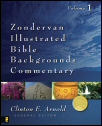
Zondervan Illustrated Bible Backgrounds Commentary: New Testament, vol. 1: Matthew, Mark, Luke
- Editor: Clinton E. Arnold
- Publisher: Zondervan
- Publication Date: 2002
- Pages: 516
This volume helps readers understand the historical and cultural background of the New Testament. Brimming with lavish, full color photos and graphics, each book walks you verse-by-verse through the New Testament.
Reading this volume is like slipping on a set of glasses that lets you read the Bible through the eyes of a first-century reader! Discoveries await you that will snap the world of the New Testament into gripping immediacy. Things that seem mystifying, puzzling, or obscure will take on tremendous meaning when you view them in their ancient context. You’ll deepen your understanding of the teachings of Jesus. You’ll discover the close, sometimes startling interplay between God’s kingdom and the practical affairs of the church. Best of all, you’ll gain a deepened awareness of the Bible’s relevance for your life.
Clinton E. Arnold serves as the professor of New Testament language and literature and the department chair of New Testament studies at Talbot School of Theology in La Mirada, California. He has contributed to many journals such as Novum Testamentum and Journal for the Study of the New Testament, and is the author of How We Got the Bible, Ephesians: Power and Magic, and Powers of Darkness: Principalities and Powers in Paul’s Letters, among others.
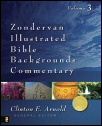
Zondervan Illustrated Bible Backgrounds Commentary: New Testament, vol. 3: Romans to Philemon
- Editor: Clinton E. Arnold
- Publisher: Zondervan
- Publication Date: 2002
- Pages: 520
This volume helps readers understand the historical and cultural background of the New Testament. Brimming with lavish, full color photos and graphics, each book walks you verse-by-verse through the New Testament.
Reading this volume is like slipping on a set of glasses that lets you read the Bible through the eyes of a first-century reader! Discoveries await you that will snap the world of the New Testament into gripping immediacy. Things that seem mystifying, puzzling, or obscure will take on tremendous meaning when you view them in their ancient context. You’ll deepen your understanding of the teachings of Jesus. You’ll discover the close, sometimes startling interplay between God’s kingdom and the practical affairs of the church. Best of all, you’ll gain a deepened awareness of the Bible’s relevance for your life.
Clinton E. Arnold serves as the professor of New Testament language and literature and the department chair of New Testament studies at Talbot School of Theology in La Mirada, California. He has contributed to many journals such as Novum Testamentum and Journal for the Study of the New Testament, and is the author of How We Got the Bible, Ephesians: Power and Magic, and Powers of Darkness: Principalities and Powers in Paul’s Letters, among others.
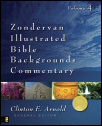
Zondervan Illustrated Bible Backgrounds Commentary: New Testament, vol. 4: Hebrews to Revelation
- Editor: Clinton E. Arnold
- Publisher: Zondervan
- Publication Date: 2002
- Pages: 384
This volume helps readers understand the historical and cultural background of the New Testament. Brimming with lavish, full color photos and graphics, each book walks you verse-by-verse through the New Testament.
Reading this volume is like slipping on a set of glasses that lets you read the Bible through the eyes of a first-century reader! Discoveries await you that will snap the world of the New Testament into gripping immediacy. Things that seem mystifying, puzzling, or obscure will take on tremendous meaning when you view them in their ancient context. You’ll deepen your understanding of the teachings of Jesus. You’ll discover the close, sometimes startling interplay between God’s kingdom and the practical affairs of the church. Best of all, you’ll gain a deepened awareness of the Bible’s relevance for your life.
Clinton E. Arnold serves as the professor of New Testament language and literature and the department chair of New Testament studies at Talbot School of Theology in La Mirada, California. He has contributed to many journals such as Novum Testamentum and Journal for the Study of the New Testament, and is the author of How We Got the Bible, Ephesians: Power and Magic, and Powers of Darkness: Principalities and Powers in Paul’s Letters, among others.

Zondervan Illustrated Bible Backgrounds Commentary: Old Testament (5 vols.)
- General Editor: John H. Walton
- Publisher: Zondervan
- Pages: 2,928
This series brings to life the world of the Old Testament through informative entries and full-color photos and graphics. Here readers find the premier commentary set for connecting with the historical and cultural context of the Old Testament. It contains over 2,000 photographs, passage-by-passage commentary on the Old Testament, analysis of Near Eastern literature, and more.
As a pastor, I am certain that the Zondervan Illustrated Bible Backgrounds Commentary: Old Testament is a deeply valuable tool for ministry. With rock-solid scholarship, relevant commentary, and gripping visual illustrations, this will be a great tool for believers for years to come.
—Kevin G. Harney, pastor and author of Organic Outreach for Ordinary People

Zondervan Encyclopedia of the Bible (5 vols.)
- General Editors: Merrill C. Tenney, Moisés Silva
- Publisher: Zondervan
- Pages: 5,616
The Zondervan Encyclopedia of the Bible has been a classic Bible study resource for more than thirty years. Now thoroughly revised, this new five-volume edition provides up-to-date entries based on the latest scholarship. Beautiful full-color pictures supplement the text, which includes new articles in addition to thorough updates and improvements of existing topics. Different viewpoints of scholarship permit a well-rounded perspective on significant issues relating to doctrines, themes, and biblical interpretation. The goal remains the same in the new edition: to provide pastors, teachers, students, and devoted Bible readers a comprehensive and reliable library of information.
The newly released Zondervan Encyclopedia of the Bible is a comprehensive study tool to be considered a core reference work of value to families, college and lay students, as well as pastors and more serious scholars. Clearly written in a contemporary style and presented in a user-friendly format, this updated version of a classic reference work is an excellent resource for homeschool study. Presenting information on both the biblical text and historical context of Scripture, the Zondervan Encyclopedia of the Bible clearly articulates the vast gamut of knowledge foundational to a study of Scripture.
—Shelly Beach, award-winning author

1001 Illustrations that Connect
- Editors: Craig Brian Larson, Phyllis Ten Elshof
- Publisher: Zondervan
- Publication Date: 2008
- Pages: 576
Every preacher, teacher, or writer knows the value of a good illustration in helping connect the truth of the passage with the congregation or class—and how hard it is to come up with good illustrations week after week. This book contains the cream of the crop: 1001 illustrations carefully selected from among thousands on Christianity Today’s popular website, PreachingToday.com. These illustrations are proven, memorable, and illuminating. As the saying goes, they will preach! And they’re fresh, all written within the past seven years.
Craig Brian Larson is chief editor for Christianity Today’s PreachingToday.com, an online journal and illustration service. He also pastors a church in Chicago, Illinois. His books include Contemporary Illustrations for Preachers, Teachers, and Writers; Preaching That Connects; and The Art and Craft of Biblical Preaching. He and his family live in the Chicago suburbs.
Phyllis Ten Elshof is employed with Christianity Today International, Carol Stream, Illinois. She has been editor of Your Church magazine, a CTI publication; news editor for The Banner, in Grand Rapids, Michigan; and a feature reporter for the Clarion-Ledger newspaper in Jackson, Mississippi. She lives near Grand Rapids, Michigan.

1001 Quotations That Connect
- Editors: Craig Brian Larson, Brian Lowery
- Publisher: Zondervan
- Publication Date: 2009
- Pages: 368
1001 Quotations that Connect features inspiring observations from a wide spectrum of influential people of the past two millennia, culled from the collection of Christianity Today. This volume—which contains the reflections of Church Fathers, missionaries, poets, and celebrities—is a gold mine for preachers, teachers, and writers.
Craig Brian Larson is chief editor for Christianity Today’s PreachingToday.com, an online journal and illustration service. He also pastors a church in Chicago, Illinois. His books include Contemporary Illustrations for Preachers, Teachers, and Writers; Preaching That Connects; and The Art and Craft of Biblical Preaching. He and his family live in the Chicago suburbs.
Brian Lowery is managing editor of PreachingToday.com. He has served as discipleship minister of Madison Park Christian Church in Quincy, Illinois, and preaching minister of Popular Creek Community Church in Bartlett, Illinois.

Africa Bible Commentary
- Editor: Tokunboh Adeyemo
- Publisher: Zondervan
- Publication Date: 2006
- Pages: 1,616
The Africa Bible Commentary is a unique publishing event—the first one-volume Bible commentary produced in Africa by African theologians to meet the needs of African pastors, students, and lay leaders. Interpreting and applying the Bible in the light of African culture and realities, it furnishes powerful and relevant insights into the biblical text that transcend Africa in their significance.
This monumental work of biblical scholarship is filled with helpful insights into God’s Word that every pastor, Bible teacher, and Christian will benefit from. We’ve needed this commentary for a long, long time!
—Rick Warren, pastor of Saddleback Church and author of The Purpose Driven Life
Tokunboh Adeyemo is the executive director of the Centre for Biblical Transformation having served previously as General Secretary for the Association of Evangelicals in Africa. He holds a Ph.D. from Dallas Theological Seminary as well as an honorary doctorate awarded by Potchefstroom University for his outstanding Christian scholarship and leadership.

Choosing to Preach
- Editor: Kenton C. Anderson
- Publisher: Zondervan
- Publication Date: 2006
- Pages: 288
With the landscape of ministry changing, preachers need a variety of tools to effectively communicate God’s truth to today’s listeners. Beginning with a strong call to keep preaching, this practical book presents and describes five different models for doing so, also relating each style to well-known contemporary preachers.
We have but one great truth to preach, but there are as many ways to preach it as there are preachers. In this important volume, Kenton Anderson teaches us to cherish two things: well-spoken truth, and our own glorious diversity.
—Calvin Miller, Beeson Divinity School
Kenton C. Anderson is dean of Northwest Baptist Seminary, and associate professor of homiletics of the Associated Canadian Theological Schools (ACTS) of Trinity Western University in Langley, British Columbia, Canada.

Dictionary of Biblical Prophecy and End Times
- Editors: J. Daniel Hays, J. Scott Duvall, C. Marvin Pate
- Publisher: Zondervan
- Publication Date: 2007
- Pages: 512
The Dictionary of Biblical Prophecy and End Times is a comprehensive reference tool designed to assist everyday people in understanding biblical prophecy. Based on solid scholarship, the dictionary contains clear and readable entries on a broad sweep of topics relevant to biblical prophecy, providing insight to complicated subjects in a balanced fashion.
J. Daniel Hays is dean of the Pruet School of Christian Studies and professor of Old Testament at Ouachita Baptist University. He is the author of From Every People and Nation, and he has coauthored Grasping God’s Word; Preaching God’s Word; Journey into God’s Word; The Story of Israel: A Biblical Theology; Iraq: Babylon of the End Times?; and Apocalypse. He teaches adult Sunday school at his local church in Arkadelphia, Arkansas, and preaches frequently throughout the nation.
J. Scott Duvall is professor of New Testament at Ouachita Baptist University. He is the coauthor with George H. Guthrie of Biblical Greek Exegesis: A Graded Approach to Learning Intermediate and Advanced Greek and with Terry G. Carter and J. Daniel Hays of the textbook Preaching God’s Word: A Hands on Approach to Preparing, Developing and Delivering the Sermon.
C. Marvin Pate taught for thirteen years at Moody Bible Institute. Now he is chair, department of Christian theology, professor of theology at Ouachita Baptist University.

Effective First-Person Biblical Preaching
- Author: J. Kent Edwards
- Publisher: Zondervan
- Publication Date: 2005
- Pages: 192
A large portion of the Bible is narrative. This fact, coupled with our culture’s fascination with story (as evidenced by its ever-increasing consumption of television, movies, and DVDs), presents the preacher with a tremendous opportunity to communicate powerful, life-changing truth in a way that is biblically honoring and culturally relevant. In first-person biblical preaching, the preacher enters into the story via one of the characters, bringing the biblical text to life in the imaginations of the congregation. After making a case for this type of sermon, Kent Edwards takes the reader step-by-step through the process of crafting a dynamic first-person sermon that is faithful to the text. Along the way, he gives numerous examples, answers practical questions, and identifies pitfalls to avoid. He addresses both the exegetical task and the homiletical task as they relate to this approach.
Not only details the means of preparation for first-person sermons, but for narrative sermons of every description.
—Kenton C. Anderson, ACTS Seminaries of Trinity Western University
J. Kent Edwards is professor of preaching and leadership as well as director of doctor of ministry program at Talbot School of Theology of Biola University. In addition to ministering regularly at churches throughout the country, Dr. Edwards is a popular conference and seminar speaker and lectures internationally in academic settings. He has published numerous articles and papers in the area of homiletics and has served as the president of the Evangelical Homiletic Society. He and his wife and family live in southern California.

Halley’s Bible Handbook
- Author: Henry H. Halley
- Publisher: Zondervan
- Publication Date: 2007
- Pages: 1,056
Now in full color for its twenty-fifth edition, this world-renowned Bible handbook is treasured by generations of Bible readers for its clarity, insight, and usefulness. Halley’s Bible Handbook makes the Bible’s wisdom and message accessible. You will develop an appreciation for the cultural, religious, and geographic settings in which the story of the Bible unfolds. You will see how its different themes fit together in a remarkable way. And you will see the heart of God and the person of Jesus Christ revealed from Genesis to Revelation.
Henry H. Halley was a well-respected author, minister, and Bible lecturer, dedicating his life to spreading his passion for Bible study and memorization. The original Halley’s Bible Handbook grew from small pamphlets about the Bible that he gave away to encourage churches and individuals in Bible study.

How to Read the Bible Book by Book
- Authors: Gordon D. Fee, Douglas Stuart
- Publisher: Zondervan
- Publication Date: 2002
- Pages: 448
Reading the Bible need not be a haphazard journey through strange and bewildering territory. Like an experienced tour guide, How to Read the Bible Book by Book, by Gordon Fee and Douglas Stuart, takes you by the hand and walks you through the Scriptures. For each book of the Bible, the authors start with a quick snapshot, then expand the view to help you better understand its key elements and how it fits into the grand narrative of the Bible. Written by two top evangelical scholars, this survey is designed to get you actually reading the Bible knowledgeably and understanding it accurately.
Gordon D. Fee is professor of New Testament at Regent College, Vancouver, British Columbia.
Douglas Stuart is professor of Old Testament at Gordon-Conwell Theological Seminary.

How to Read the Bible for All Its Worth
- Authors: Authors: Gordon D. Fee, Douglas Stuart
- Publisher: Zondervan
- Publication Date: 2003
- Pages: 288
Understanding the Bible isn’t for the few, the gifted, the scholarly. The Bible is accessible. It’s meant to be read and comprehended by everyone from armchair readers to biblical scholars, and everyone in between. A few essential insights into the Bible can clear up a lot of misconceptions and help you grasp the meaning of Scripture and its application to your 21st-century life. More than half a million people have turned to How to Read the Bible for All Its Worth to inform their reading of the Bible.
A very useful reference book for the layperson who is engaged in study of the Bible.
—Booklist
Gordon D. Fee is professor of New Testament at Regent College, Vancouver, British Columbia.
Douglas Stuart is professor of Old Testament at Gordon-Conwell Theological Seminary.

Mounce’s Complete Expository Dictionary of Old and New Testament Words
- Author: William D. Mounce
- Publisher: Zondervan
- Publication Date: 2006
- Pages: 1,344
Mounce’s Expository Dictionary of Old and New Testament Words is ideal for readers with limited or no knowledge of Greek or Hebrew who want greater insight into the meanings of biblical words to enhance Bible study. It is also the perfect reference guide for busy pastors needing to quickly get at the heart of a word’s meaning without wading through more technical studies. William Mounce, whose Greek grammar has been used by more than 100,000 college and seminary students, is the editor of this new dictionary, which will become the layperson’s gold standard for biblical word studies.
At last! A word study book which I can unhesitatingly recommend to those who are not proficient in the original languages. I plan to purchase several copies for my colleagues.
—Ajith Fernando
William D. Mounce (Ph.D., Aberdeen University) lives as a writer in Spokane, Washington. He is the president of Biblical Training, a non-profit organization offering the finest in evangelical teaching to the world for free. Formerly he was the preaching pastor at a church in Spokane, and prior to that a professor of New Testament and director of the Greek program at Gordon-Conwell Theological Seminary. He is the author of the bestselling New Testament Greek resource, Basics of Biblical Greek, and served as the New Testament chair of the English Standard Version translation of the Bible.

New International Bible Commentary
- Author: F. F. Bruce
- Publisher: Zondervan
- Publication Date: 1987
- Pages: 1,664
In one volume, the Gold Medallion Award-winning New International Bible Commentary unlocks the message and meaning of every book of the Bible. This acclaimed book marshals the insights of forty-three world-class evangelical scholars to help you gain a deeper, life-changing understanding of Scripture.
A magnificent achievement.
—Christianity Today
The outstanding volume of the year.
—Christian Herald
F. F. Bruce was born in Scotland in 1910 and educated at the Universities of Aberdeen, Cambridge, and Vienna. After teaching Greek for several years at the University of Edinburgh and then at the University of Leeds he became the head of the Department of Biblical History and Literature at the University of Sheffield in 1947. In 1959 he moved to the University of Manchester where he became professor of Biblical Criticism and Exegesis. During his career he wrote some thirty-three books and served as editor of The Evangelical Quarterly and the Palestine Exploration Quarterly. He retired from teaching in 1978 and died in 1990.

New International Bible Dictionary
- Author: J. D. Douglas
- Publisher: Zondervan
- Publication Date: 1987
- Pages: 1,200
The Silver Medallion award-winning New International Bible Dictionary was created to help you get more out your study of the Bible. Containing more than 4,500 entries and more than 1,000 illustrations, maps, charts, photos, and tables, it is the first Bible dictionary based entirely on the NIV translation. It delivers an encyclopedic wealth of insight into the historical, chronological, archaeological, geographical, social, theological, and biographical aspects of the Bible. Whether you’re a general reader of the Bible, a pastor, or a student, this volume belongs in your library.
A massive, important work.
—The Biblical Evangelist
J. D. Douglas was the revising editor of The New International Dictionary of the Bible and editor of The New Bible Dictionary. He was editor-at-large for Christianity Today.

New International Dictionary of the Christian Church
- Editor: J. D. Douglas
- Publisher: Zondervan
- Publication Date: 2007
- Pages: 1,074
The New International Dictionary of the Christian Church is a fascinating encyclopedia explaining the development of the church. This comprehensive reference work traces the development of the Christian church through its first 2,000 years. More than 180 scholars have contributed their expertise, incorporating recent research, archaeological discoveries, and specialized studies. Cross-references and bibliographies of significant works enhance this dictionary’s usefulness as a basic source book and study tool.
J. D. Douglas was the revising editor of The New International Dictionary of the Bible and editor of The New Bible Dictionary. He was editor-at-large for Christianity Today.

New International Encyclopedia of Bible Characters
- Editor: Paul D. Gardner
- Publisher: Zondervan
- Publication Date: 2001
- Pages: 704
Uncover the value of every man and woman in the Bible! From Aaron to Zurishadai, the New International Encyclopedia of Bible Characters is an exhaustive, ready reference of every person named in the Bible. Discover the parts men and women, from the obscure to the famous to the infamous, have played in the unfolding story of Scripture. Entries range from one-line biblical references for minor characters to full-length articles that address the theological significance of over forty major figures.
Paul Gardner (Ph.D. Cambridge University) taught for seven years at Oak Hill Theological College after his ordination, and then moved to parish ministry in Cheshire. In 2003 he was appointed Archdeacon of Exeter. He has published a number of books and articles, including a commentary on 2 Peter and Jude in the Focus on the Bible Commentaries (32 Vols.).

New International Encyclopedia of Bible Difficulties
- Author: Gleason L. Archer, Jr.
- Publisher: Zondervan
- Publication Date: 2001
- Pages: 480
What do you make of the difficult areas in the Bible—those puzzling passages that make you stop and scratch your head? The seeming contradictions and inconsistencies of Scripture actually have sound explanations. But unless you’re a Bible scholar, you probably don’t know about them. That’s why you need the New International Encyclopedia of Bible Difficulties. It gives you informed answers to your most troublesome questions. Some of the solutions seem obvious—after you’ve read them. But most include an eye-opening look at linguistic, cultural, numerical, relational, and other considerations of which most Bible readers are unaware.
Gleason L. Archer Jr. was professor emeritus of Old Testament and Semitic studies at Trinity Evangelical Divinity School.

New International Encyclopedia of Bible Words
- Author: Lawrence O. Richards
- Publisher: Zondervan
- Publication Date: 1999
- Pages: 736
An encyclopedia based on the NIV and the NASB, this volume explores the Hebrew and Greek words that lie behind the English words. Whether you’re a pastor, a student, or simply a lover of the Bible, this book helps you get more out of God’s Word by revealing the original meanings of key biblical words. The reader-friendly, narrative style makes it easy to explore the Hebrew and Greek words that lie behind the English words. You’ll discover significant shades of meaning and nuances that bring depth to your understanding of Scripture.
Exceptional value. . . . Clear, precise, and balanced.
—James Montgomery Boice, Pastor, Tenth Presbyterian Church, Philadelphia
Lawrence O. Richards is currently a full time author and speaker. He has written over 200 Christian books, including commentaries on every book of the Bible and the best-selling Adventure Bible and Teen Study Bible.

Preaching God’s Word
- Authors: Terry G. Carter, J. Scott Duvall, J. Daniel Hays
- Publisher: Zondervan
- Publication Date: 2005
- Pages: 304
People in churches today are hungry for a word from God. Preachers need to prepare and deliver sound biblical sermons that connect with their audience in a meaningful way. Whether you are a student new to preaching or a veteran looking to brush up your preaching skills, here is a valuable resource.
Carter, Duvall, and Hays have given us a basic and worthy manual of how-to’s for preaching. Never since Haddon Robinson’s classic text has a book taken such a practical and understandable, step-by-step approach to the sermon.
—Calvin Miller, Professor of Divinity, Beeson Divinity School
Terry G. Carter is chair of the department of Christian ministries and holder of the W.O. Vaught Chair in the Pruet School of Christian Studies at Ouachita Baptist University. He teaches homiletics, pastoral ministry, Christian history, evangelism and church growth, missions, and survey of the Bible. He is author of The Journal and Selected Letters of William Carey.
J. Scott Duvall is professor of New Testament at Ouachita Baptist University. He is the coauthor with George H. Guthrie of Biblical Greek Exegesis: A Graded Approach to Learning Intermediate and Advanced Greek and with Terry G. Carter and J. Daniel Hays of the textbook Preaching God’s Word: A Hands on Approach to Preparing, Developing and Delivering the Sermon.
J. Daniel Hays is dean of the Pruet School of Christian Studies and professor of Old Testament at Ouachita Baptist University. He is the author of From Every People and Nation, and he has coauthored Grasping God’s Word; Preaching God’s Word; Journey into God’s Word; The Story of Israel: A Biblical Theology; Iraq: Babylon of the End Times?; Apocalypse; and The Dictionary of Biblical Prophecy. He teaches adult Sunday school at his local church in Arkadelphia, Arkansas, and preaches frequently throughout the nation.

Rick Warren’s Bible Study Methods
- Author: Rick Warren
- Publisher: Zondervan
- Publication Date: 2006
- Pages: 272
You were created to become like Christ. This is one of the five God-ordained purposes for your life described in The Purpose Driven Life, by Rick Warren, and it’s why studying the Bible is so important. The Bible’s truths will transform you, aligning you with the character and ways of Jesus as you encounter him in the Scriptures. This easy-to-understand book shows you how to study the Bible Rick Warren’s way. It gives you not just one, but twelve methods for exploring the riches of God’s Word. At least one of them is exactly what you’re looking for—an approach that’s right for you, right where you’re at.
Rick Warren is often called America’s most influential spiritual leader. He founded Saddleback Church in Orange County, California, which is now one of the largest and best-known churches in the world. He also founded the Purpose Driven movement, a network of tens of thousands of churches from all denominations in 160 countries. He has trained over 350,000 pastors worldwide.

The Art and Craft of Biblical Preaching
- Editors: Haddon Robinson, Craig Brian Larson
- Publisher: Zondervan
- Publication Date: 2005
- Pages: 736
The Art and Craft of Biblical Preaching is the most complete practical encyclopedia ever written on the practice of preaching. It is edited by Haddon Robinson and Craig Brian Larson, and uses significant resources from the ministries of Christianity Today International.
Packed with useful tools that span a wide array of homiletical issues. . . . A tremendous value to preachers seeking to be effective communicators. . . . Pastors will appreciate the many practical ideas, and cautions, offered by the contributors. . . . One of the first volumes a pastor should receive when beginning in ministry. With its brief chapters, the book can be utilized as a chapter-a-day continuing education resource.
—Leadership Journal
Haddon Robinson is the Harold John Ockenga Distinguished Professor of Preaching at Gordon-Conwell Theological Seminary, and he is widely regarded as an expert in the area of preaching. He is also the editor of Biblical Sermons: How Twelve Preachers Apply the Principles of Biblical Preaching.
Craig Brian Larson is chief editor for Christianity Today’s PreachingToday.com, an online journal and illustration service. He also pastors a church in Chicago, Illinois. His books include Contemporary Illustrations for Preachers, Teachers, and Writers; Preaching That Connects; and The Art and Craft of Biblical Preaching. He and his family live in the Chicago suburbs.

The Bible for Blockheads
- Author: Douglas Connelly
- Publisher: Zondervan
- Publication Date: 2007
- Pages: 480
This user-friendly guide to the Bible will help you make sense of all the Bible’s mysteries to reveal its truly amazing content. Now revised and updated to reflect the most recent cultural changes, this book includes new features and engaging artwork.
This user-friendly introduction to the Bible . . . is for those embarking on Bible study for the first time. A brief introduction presents an overview of the Bible, its history, and approaches to studying it; each chapter contains a summary of a biblical book and is sprinkled with historical and archaeological tidbits; five ‘Tool Time’ essays, placed throughout the volume, introduce readers to commentaries, concordances, dictionaries, and atlases.
—Craig W. Beard, Library Journal
Douglas Connelly is the senior pastor of Parkside Community Church in Sterling Heights, Michigan, and an adjunct professor at Spring Arbor University. He is the author of several books, including The Book of Revelation for Blockheads and Amazing Discoveries That Unlock the Bible.

The Essential Bible Companion
- Authors: John H. Walton, Mark L. Strauss, Ted Cooper Jr.
- Publisher: Zondervan
- Publication Date: 2006
- Pages: 152
The Essential Bible Companion gives you what it promises: the essentials. The most vital, absolutely indispensable information you need for reading and truly understanding God’s Word. Developed by two world-class Bible scholars and the creator of The Bible in 90 Days curriculum, this unique, easy-to-use reference guide gives you clear, crisp insights into the Bible book by book.
John H. Walton is professor of Old Testament at Wheaton College Graduate School. He is the author or coauthor of several books, including Chronological and Background Charts of the Old Testament; Ancient Israelite Literature in Its Cultural Context; Covenant: God’s Purpose, God’s Plan; The IVP Bible Background Commentary: Old Testament, available in from Logos in The Essential IVP Reference Collection Version 3; and A Survey of the Old Testament.
Mark Strauss is professor of New Testament at Bethel Seminary in San Diego. He has written The Davidic Messiah in Luke-Acts, available from Logos in the Library of NT Studies: JSNTS on the Gospels and Acts (16 Vols.), Distorting Scripture?, The Challenge of Bible Translation and Gender Accuracy, and Luke in the Zondervan Illustrated Bible Background Commentary series. Forthcoming books include The Gospels and Jesus, Mark in the revised Expositor’s Bible Commentary series, and Mark in the Zondervan Exegetical Commentary series.
Ted Cooper founded Bible in 90 Days in 2002 following almost 20 years in the computer industry. Ted has served on a number of professional and charity boards and is an elder at First Presbyterian Church of Houston, where he currently serves on the Session. Ted is married to Rebecca, and they live with their three children in Houston.

The Power of Multisensory Preaching and Teaching
- Author: Rick Blackwood
- Publisher: Zondervan
- Publication Date: 2009
- Pages: 208
Most preaching and teaching in the church engages only one of the senses—hearing. In The Power of Multisensory Preaching and Teaching, Rick Blackwood shows how recognizing and engaging the multiple senses of the congregation can lead to greater impact.
We have all heard the statistics that listeners retain a lot more of what we are saying if we can help them to do more than simply hear it. Believing the statistics to be true, we have dabbled with object lessons, drama, and PowerPoint, all in the effort to utilize a broader range of sensory appeal. Finally, now we have a resource that confirms what we have long suspected. Rich Blackwood not only gives us the research, but he gives us a method that is practical, sustainable, and steeped in expository conviction. This is a book for preachers that are already good at what they do, increasing their communication quotient so as to deepen their listener’s engagement with the Word.
—Kenton C. Anderson, author of Choosing to Preach
Rick Blackwood serves as the senior pastor of Christ Fellowship in Miami, Florida, a large and growing multicultural congregation comprised of more than seventy nationalities. Christ Fellowship has been listed in the 100 Fastest Growing Churches in America. Prior to his ministry in Miami, Rick served churches in North Carolina. Rick lives with his wife and two children in Miami.
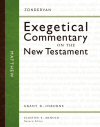
In this volume of the Zondervan Exegetical Commentary on the New Testament series, Grant Osborne offers pastors, students, and teachers a focused resource for reading the Gospel of Matthew. Through the use of graphic representations of translations, succinct summaries of main ideas, exegetical outlines, and other features, Osborne presents the Gospel of Matthew with precision and accuracy.
Grant R. Osborne (PhD, University of Aberdeen) is professor of New Testament at Trinity Evangelical Divinity School in Deerfield, Illinois. He has been at Trinity since 1977. His areas of expertise include the Gospels, hermeneutics, and the book of Revelation. His numerous publications include The Hermeneutical Spiral and commentaries on Revelation, Romans, John, and Matthew.
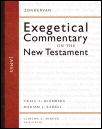
Authors Craig Blomberg and Mariam Kamell use the historical, theological and literary elements of James to guide their interpretation of this often-overlooked early Christian text. Their concise discussion of how the book delivers consistent, challenging instruction will help pastors and church leaders teach the message of James to today’s readers.
Craig L. Blomberg holds a PhD from the University of Aberdeen, Scotland. He is the author, co-author, or co-editor of 15 books and more than 80 articles in journals or multi-author works.
Mariam J. Kamell is a post-doctoral fellow at Regent College, Vancouver. She has published several articles on James focused on its economics or in comparison with Hebrews or 1 Peter; her dissertation focused on soteriology in James in comparison with earlier Jewish wisdom literature and the Gospel of Matthew.
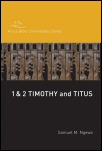
This commentary by Samuel Ngewa is divided into preaching units that contain detailed exposition of the passage as well as contemporary applications. The unit is not intended to be preached as a sermon, but provides material to be drawn on in sermon preparation. Each unit is followed by two or three questions that could be used for a small group or personal study. Academic issues relating to the Greek text and disputes about interpretation are dealt with in the extensive end notes. Africa Bible Commentaries: 1, 2 Timothy and Titus is thus suitable for use as a teaching resource for theological colleges and Bible schools while also being suited to readers who are looking for ways to preach and apply the Scriptures.
Samuel Ngewa received his PhD at Westminster Theological Seminary and is currently professor of New Testament Studies at the Nairobi Evangelical Graduate School of Theology, Kenya. Formerly, he was a faculty member of Scott Theological College.
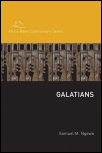
Galatians, the second of the Africa Bible Commentary series preaching commentaries written by Samuel Ngewa, is both a teaching resource for theological colleges and Bible schools all over the country and a Scriptural resource for lay readers to preach and apply God’s Word all over the world.
Samuel Ngewa received his PhD at Westminster Theological Seminary and is currently professor of New Testament Studies at the Nairobi Evangelical Graduate School of Theology, Kenya. Formerly, he was a faculty member of Scott Theological College.
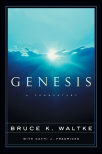
Exploring the first book of the Bible as “theological literature,” Bruce K. Waltke illuminates its meanings and methods for the pastor, scholar, teacher, student, and Bible-lover. Genesis strikes an unusual balance by emphasizing the theology of the Scripture text while also paying particular attention to the flow and development of the plot and literary techniques—inclusion, irony, chiasm, and concentric patterning—that shape the message of the “book of beginnings”.
Bruce K. Waltke, acknowledged to be one of the outstanding contemporary Old Testament scholars, is professor of Old Testament at Reformed Theological Seminary in Orlando, Florida, and professor emeritus of biblical studies at Regent College in Vancouver. He has authored and co-authored numerous books, commentaries, and articles, and contributed to dictionaries and encyclopedias.
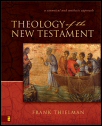
Studying the theology of the New Testament can be a daunting task, even to the knowledgeable Bible student or pastor. Each of the 27 books, written by various authors, has its own theological emphasis and nuances. How do we elicit a coherent message from such theological diversity, especially given that some of the theological statements in the New Testament seem to be at odds with one another? Is such an endeavor achievable or even valid?
Theology of the New Testament takes a balanced approach in response to these challenges. Frank Thielman presents a theology of the New Testament that is careful to take into account the cultural and historical circumstances surrounding each book and the New Testament as a whole. He not only examines each book’s theological content individually, but also in relation to the rest of the New Testament, particularly within each of the three theological units that comprise the New Testament: the Gospels and Acts, the Pauline epistles, and the general epistles and Revelation.
Frank Thielman (PhD, Duke University) is Presbyterian professor of divinity at Beeson Divinity School, Samford University, in Birmingham, Alabama. He is the author of Philippians in the NIV Application Commentary series.
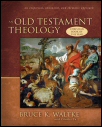
The Old Testament is more than a religious history of the nation of Israel. It is more than a portrait gallery of heroes of the faith. It is even more than a theological and prophetic backdrop to the New Testament. Beyond these, the Old Testament is inspired revelation of the very nature, character, and works of God. As renowned Old Testament scholar Bruce Waltke writes in the preface of this book, the Old Testament’s every sentence is “fraught with theology, worthy of reflection.”
This book is the result of decades of reflection informed by an extensive knowledge of the Hebrew language, the best of critical scholarship, a deep understanding of both the content and spirit of the Old Testament, and a thoroughly evangelical conviction. Taking a narrative, chronological approach to the text, Waltke employs rhetorical criticism to illuminate the theologies of the biblical narrators. Through careful study, he shows that the unifying theme of the Old Testament is the “breaking in of the kingdom of God.” This theme helps the reader better understand not only the Old Testament, but also the New Testament, the continuity of the entire Bible, and ultimately, God himself.
Bruce K. Waltke, acknowledged to be one of the outstanding contemporary Old Testament scholars, is professor of Old Testament at Reformed Theological Seminary in Orlando, Florida, and professor emeritus of biblical studies at Regent College in Vancouver. He has authored and co-authored numerous books, commentaries, and articles, and contributed to dictionaries and encyclopedias.
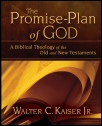
What is the central theme of the Bible? Given the diversity of authorship, genre, and context of the Bible’s various books, is it even possible to answer such a question? Or in trying to do so, is an external grid being unnaturally superimposed on the biblical text? These are difficult questions that the discipline of biblical theology has struggled to answer. In this thoroughly revised and expanded edition of his classic Toward an Old Testament Theology, Walter Kaiser offers a solution to these unresolved issues. He proposes that there is indeed a unifying center to the theology and message of the Bible that is indicated and affirmed by Scripture itself. That center is the promise of God. It is one all-encompassing promise of life through the Messiah that winds itself throughout salvation history in both the Old and New Testaments, giving cohesiveness and unity to the various parts of Scripture.
After laying out his proposal, Kaiser works chronologically through the books of both Testaments, demonstrating how the promise is seen throughout, how the various sub-themes of each book relate to the promise, and how God’s plan to fulfill the promise progressively unfolds. Here is a rich and illuminating biblical theology that will stir the emotion and the intellect.
Walter C. Kaiser Jr. received his PhD from Brandeis University. He is distinguished professor emeritus of Old Testament and president emeritus of Gordon-Conwell Theological Seminary in South Hamilton, Massachusetts. Dr. Kaiser has written over 40 books, including Toward an Exegetical Theology: Biblical Exegesis for Preaching and Teaching; The Messiah in the Old Testament; and The Promise-Plan of God; and co-authored An Introduction to Biblical Hermeneutics: The Search for Meaning.
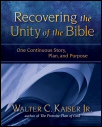
In this volume, Walter Kaiser makes the case for the unity of the Bible. The theological unity of the Bible celebrates the diversity of the Bible, but does so with the conviction that even though that unity can be tested historically, ethically, and otherwise, it has not detracted from the central case for the theological harmony that is found in the text. This has been the general conclusion of two millennia of Judo-Christian exegesis.
Walter C. Kaiser Jr. received his PhD from Brandeis University. He is distinguished professor emeritus of Old Testament and president emeritus of Gordon-Conwell Theological Seminary in South Hamilton, Massachusetts. Dr. Kaiser has written over 40 books, including Toward an Exegetical Theology: Biblical Exegesis for Preaching and Teaching; The Messiah in the Old Testament; and The Promise-Plan of God; and co-authored An Introduction to Biblical Hermeneutics: The Search for Meaning.
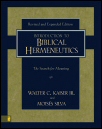
Since its publication in 1994, An Introduction to Biblical Hermeneutics has become a standard text for a generation of students, pastors, and serious lay readers. This second edition has been substantially updated and expanded, allowing the authors to fine-tune and enrich their discussions on fundamental interpretive topics. In addition, four new chapters have been included that address more recent controversial issues:
- The Role of Biblical Theology in Interpretation
- How to Deal With Contemporary Questions Not Directly Addressed in the Bible
- The New Testament’s Use of the Old Testament
- The Role of History in Interpretation
The book retains the unique aspect of being written by two scholars who hold differing viewpoints on many issues, making for vibrant, thought-provoking dialogue. What they do agree on, however, is the authority of Scripture, the relevance of personal Bible study to life, and why these things matter.
Walter C. Kaiser Jr. received his PhD from Brandeis University. He is distinguished professor emeritus of Old Testament and president emeritus of Gordon-Conwell Theological Seminary in South Hamilton, Massachusetts. Dr. Kaiser has written over 40 books, including Toward an Exegetical Theology: Biblical Exegesis for Preaching and Teaching; The Messiah in the Old Testament; and The Promise-Plan of God; and co-authored An Introduction to Biblical Hermeneutics: The Search for Meaning.
Moisés Silva taught biblical studies at Westmont College, Westminster Theological Seminary, and Gordon-Conwell Seminary. He is the author or co-author of eight books, and the revising editor of the Zondervan Encyclopedia of the Bible.
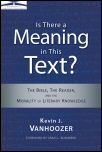
Is There a Meaning in This Text? by Kevin J. Vanhoozer guides the student toward greater confidence in the authority, clarity, and relevance of Scripture, and a well-reasoned expectation to understand accurately the message of the Bible. This volume is a comprehensive and creative analysis of current debates over biblical hermeneutics that draws on interdisciplinary resources, all coordinated by Christian theology. It makes a significant contribution to biblical interpretation that will be of interest to readers in a number of fields.
The intention of the book is to revitalize and enlarge the concept of author–oriented interpretation and to restore confidence that readers of the Bible can reach understanding. The result is a major challenge to the central assumptions of postmodern biblical scholarship and a constructive alternative proposal—an Augustinian hermeneutic—that reinvigorates the notion of biblical authority and finds a new exegetical practice that recognizes the importance of both the reader’s situation and the literal sense.
There is meaning in Vanhoozer’s text! Plenty of it, in fact. It is a meaning that traces with a discerning eye the history of authorship and authority, of readership and interpretation—right up to the present time and all under the umbrella of both thinking Christianly and living Christianly. Here is historical, philosophical, and theological exegesis—capped with creative construction—of the first order. As was said to Saint Augustine, on whose thought Vanhoozer builds, Tolle, lege. Take up! Read!
—Robert H. Gundry, Scholar-in-Residence, Westmont College
Kevin J. Vanhoozer, who received his PhD at Cambridge University, is Blanchard Professor of Theology at the Wheaton College and Graduate School. He is the author or editor of 16 books, including The Drama of Doctrine and the forthcoming Remythologizing Theology.
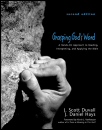
This volume is the revised and updated edition of Grasping God’s Word, an indispensable approach to reading, interpreting and applying the Bible that teaches students how to carefully read Scripture in the biblical context, and to dig deeper into the Word of God so they will be able to understand the Bible correctly and apply its meaning to their lives.
It leads students from the most fundamental building blocks of interpretation (including skills that most beginning students lack) through all the essential processes.
—Craig S. Keener, Professor of New Testament, Eastern Seminary
J. Scott Duvall, who received his PhD at Southwestern Baptist Theological Seminary, is professor of New Testament at Ouachita Baptist University. He is the co-author with George H. Guthrie of Biblical Greek Exegesis: A Graded Approach to Learning Intermediate and Advanced Greek and with Terry G. Carter and J. Daniel Hays of the textbook Preaching God’s Word: A Hands on Approach to Preparing, Developing and Delivering the Sermon.
J. Daniel Hays is dean of the Pruet School of Christian Studies and professor of Old Testament at Ouachita Baptist University. He is the author of From Every People and Nation, and he has co-authored Grasping God’s Word; Preaching God’s Word; Journey into God’s Word; The Story of Israel: A Biblical Theology; Iraq: Babylon of the End Times?; Apocalypse; and The Dictionary of Biblical Prophecy. He teaches adult Sunday school at his local church in Arkadelphia, Arkansas, and preaches frequently throughout the nation.
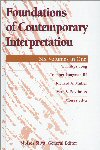
Foundations of Contemporary Interpretation
- Editor: Moisés Silva
- Publisher: Zondervan
- Publication Date: 1996
- Pages: 690
Foundations of Contemporary Interpretation by Moisés Silva seeks to identify and clarify the basic problems of interpretation that affect our reading of the Bible today. This unique volume provides a comprehensive and systematic coverage of the field of general hermeneutics. Foundations of Contemporary Interpretation examines the impact of specific academic disciplines on the interpretation of the Bible. Previously published as separate volumes, its various sections explore the interface between hermeneutics and literary criticism, linguistics, history, science, and theology. Included in Foundations of Contemporary Interpretation.
- Has the Church Misread the Bible?, by Moisés Silva
- Literary Approaches to Biblical Interpretation, by Tremper Longman III
- God, Language, and Scripture, by Moisés Silva
- The Art of Biblical History, by V. Philips Long
- Science and Hermeneutics, by Vern S. Poythress
- The Study of Theology, by Richard A. Muller.
It leads students from the most fundamental building blocks of interpretation (including skills that most beginning students lack) through all the essential processes.
—Craig S. Keener, Professor of New Testament, Eastern Seminary
Moisés Silva taught biblical studies at Westmont College, Westminster Theological Seminary, and Gordon-Conwell Seminary. He is the author or co-author of eight books, and the revising editor of the Zondervan Encyclopedia of the Bible.
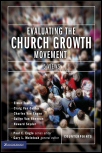
What exactly is church growth? In what ways has the movement actually brought growth to the church, and how effective has it been in doing so? What are its strengths and weaknesses? This timely book addresses such questions. After providing a richly informative history and overview, it explores—in a first-ever roundtable of their leading voices—five main perspectives, both pro and con, on the classic Church growth movement.
Contents and contributors:
- “Effective Evangelism View,” by Elmer Towns
- “Gospel in Our Culture View,” by Craig Van Gelder
- “Centrist View,” by Charles Van Engen
- “Reformist View,” by Gailyn Van Rheenan
- “Renewal View,” by Howard Snyder
Dr. Gary L. McIntosh teaches at Talbot School of Theology, is a professor of Christian ministry and leadership, leads 20-25 national seminars a year, serves as a church consultant, was president of the American Society of Church Growth in 1995–1996, and has written over 95 articles and 10 books, including Finding Them, The Issachar Factor, Three Generations, One Size Doesn’t Fit All, Overcoming the Dark Side, and Staffing Your Church for Growth.
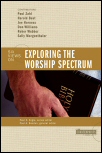
This volume outlines a clear, engaging description of the six most prevalent models of worship in North American churches, presented by advocates for each position. The contributors evaluate each position in order to broaden people’s understanding of diverse models and shed light on an emotive issue.
Contents and contributors:
- “Formal-Liturgical,” by Paul Zahl
- “Traditional Hymn-Based,” by Harold Best
- “Contemporary Music-Driven,” by Joe Horness
- “Charismatic,” by Don Williams
- “Blended,” by Robert Webber
- “Emerging,” by Sally Morgenthaler
Six different writers each present a chapter on their particular worship—running the gamut from formal liturgical, to charismatic, to emerging worship. Each chapter is followed by short commentaries by the other writers providing a variety of perspectives on each worship style. What emerges is a fascinating conversation that doesn’t try to convert you to one particular style of worship, but broadens your mind to the inherent worth of different types of worship. A good read.
—YouthWorker Journal
Paul Basden is one of the senior pastors at Preston Trail Community Church in Frisco, Texas. He has also served as pastor of other churches in Alabama and Texas and as an adjunct professor at Beeson Divinity School. He is a graduate of Baylor University and Southwestern Baptist Theological Seminary and the author of The Worship Maze.
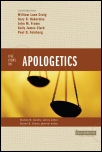
Contents and contributors:
- “Classical Aplogetics,” by William Lane Craig
- “Evidential Apologetics,” by Gary R. Habermas
- “Cumulative Case Apologetics,” by Paul D. Feinberg
- “Presuppositional Apologetics,” by John M. Frame
- “Reformed Epistemology Apologetics,” by Kelly James Clark
Steven B. Cowan, MDiv, PhD, is associate professor of philosophy and apologetics at Southeastern Bible College in Birmingham, AL.
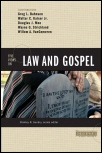
Do the Law and the Gospel belong to two separate dispensations? Has the Gospel replaced the Law? What is the relevance of the Old Testament Law to our lives as Christians? Is there continuity between it and what Christ expects of us in the Gospel? It is no secret that Christians have differed widely on these questions. This book explores five major approaches to this important biblical topic that have developed in Protestant circles. Each of the five authors presents his particular perspective on the issue and responds to the other four.
Contents and contributors:
- “The Law is the Perfection of Righteousness in Jesus Christ: A Reformed Perspective,” by Willem A. Vangemeron
- “The Theonomic Reformed Approach to Law and Gospel,” by Greg L. Bahnsen
- “The Law as God’s Gracious Guidance for the Promotion of Holiness,” by Walter C. Kaiser Jr.
- “The Inauguration of the Law of Christ with the Gospel of Christ: A Dispensational View,” by Wayne G. Strickland
- “The Law of Christ as the Fulfillment of the Law of Moses: A Modified Lutheran View,&dquo; by Douglas Moo
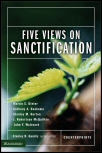
Christians generally recognize the need to live a holy, or sanctified, life. But they differ on what sanctification is and how it is achieved. Five Views on Sanctification brings together in one easy-to-understand volume five major Protestant views on sanctification. Writing from a solid evangelical stance, each author describes and defends his own understanding of the doctrine, and responds as well to the views of the other authors.
This book addresses such practical questions as: How does one achieve sanctification in this life? How much success in sanctification is possible? Is a crisis experience following one’s conversion normal—or necessary? If so, what kind of experience, and how is it verified?
Contents and contributors:
- “The Wesleyan Perspective,” by Melvin E. Dieter
- “The Reformed Perspective,” by Anthony A Hoekema
- “The Pentecostal Perspective,” by Stanley M. Horton
- “The Keswick Perspective,” by J. Robertson McQuilkin
- “The Augustinian-Dispensational Perspective,” by John F. Walvoord
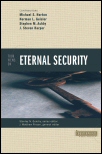
Does the Bible support the concept of “once saved, always saved,” or can a person lose his or her salvation? How do the Scriptures portray the complex interplay between grace and free will? These and related questions are explored from different angles in this thought-provoking Counterpoints volume.
The contributors each state their case for one of four prominent views on eternal security: classical Calvinist, moderate Calvinist, reformed Arminian, and Wesleyan Arminian. In keeping with the forum approach of the Counterpoints series, each view is first presented by its proponent, then critiqued and defended. This fair and respectful approach allows you to weigh for yourself the strengths and weaknesses of the different doctrinal stances. By furnishing you with scholarly and thoughtful perspectives on the topic of eternal security, this book helps you sift through opposing views to arrive at your own informed conclusions.
Contents and contributors:
- “A Classical Calvinist View,” by Michael S. Horton
- “A Moderate Calvinist View,” by Norman L. Geisler
- “A Reformed Arminian View,” by Stephen M. Ashby
- “A Wesleyan Arminian View,” by J. Steven Harper
J. Matthew Pinson is president of Free Will Baptist Bible College in Nashville, Tennessee.
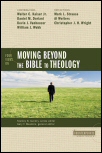
The Bible has long served as the standard for Christian practice, yet believers still disagree on how biblical passages should be interpreted and applied. Only when readers fully understand the constructs that inform their process of moving from Scripture to theology—and those of others—can Christians fully evaluate teachings that claim to be “biblical.” Here, scholars who affirm an inspired Bible, relevant and authoritative for every era, present models they consider most faithful to Scripture.
Contents and contributors:
- “A Principlizing Model,” by Walter C. Kaiser Jr.
- “A Redemptive-Historical Model,” by Daniel M. Doriani
- “A Drama-of-Redemption Model,” by Kevin J. Vanhoozer
- “A Redemptive-Movement Model,” by William J. Webb
Moreover, due to the far-reaching implications this topic holds for biblical studies, theology, and church teaching, this book includes three additional reflections by Christopher J. H. Wright, Mark L. Strauss, and Al Wolters on the theological and practical interpretation of biblical texts.
Gary T. Meadors is professor of Greek and New Testament at Grand Rapids Theological Seminary. He is author of Decision Making God’s Way and a contributor to the Evangelical Dictionary of Biblical Theology.
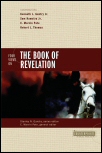
Is the book of Revelation a blueprint for the future that needs decoding if we want to understand current events? Is it a book of powerful imagery, with warnings and promises for the church throughout the ages? Or is it essentially an imaginative depiction of historical events in the first century? Four Views on the Book of Revelation explores the four main views in which Revelation is understood: preterist, idealist, classical dispensationalist futurist, and progressive dispensationalist.
Contents and contributors:
- “A Preterist View of Revelation,” by Kenneth L Gentry Jr.
- “An Idealist View of Revelation,” by Sam Hamstra Jr.
- “A Progressive Dispensationalist View of Revelation,” by C. Marvin Pate
- “A Classical Dispensationalist View of Revelation,” by Robert L. Thomas
C. Marvin Pate taught for 13 years at Moody Bible Institute. Now he is chair of the department of Christian theology and professor of theology at Ouachita Baptist University. Pate has authored, co-authored, or edited 20 books.
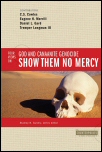
Christians are often shocked to read that Yahweh, the God of the Israelites, commanded the total destruction—all men, women, and children—of the ethnic group known as the Canaanites. This seems to contradict Jesus’ command in the New Testament to love your enemies and do good to all people. How can Yahweh be the same God as the Father of our Lord Jesus Christ? What does genocide in the Bible have to do with the politics of the twenty-first century? This book explores, in typical Counterpoints format, the Old Testament command of God to exterminate the Canaanite population and what that implies about continuity between the Old and New Testaments.
Contents and contributors:
- “Strong Discontinuity,” by C. S. Cowles
- “Moderate Discontinuity,” by Eugene H. Merrill
- “Spiritual Continuity,” by Daniel L. Gard
- “Eschatological Continuity,” by Tremper Longman III
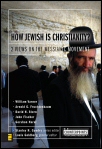
Are Messianic congregations necessary or should Jewish believers be incorporated into the Gentile church? The question of how Christian Jews relate their Jewish practices and customs to the church has been an issue within Christianity since the first century. Contemporary contributors who have lived and wrestled with this issue present informed arguments and counter-arguments. The book concludes with a chapter on the future for Messianic Jews and a directory of messianic movement organizations.
Contents and contributors:
- “Messianic Congregations are not Necessariy,” William Varner
- “Messianic Congregations May Exist within the Body of Messiah, as Long as They Don’t Function Contrary to the New Testament,” by Arnold G. Fruchtenbaum
- “The Future of Messianic Judaism,” by David Stern
Louis Goldberg is one of the foremost Messianic Jewish authors in the world. He has written 14 books and numerous articles for encyclopedias, worked on the translation of the New International Version of the Bible; and consulted on the New King James Bible. He received his ThM from Northern Baptist Theological Seminary and his ThD from Grace Theological Seminary. He is former Professor of Theology and Jewish Studies at Moody Bible Institute.
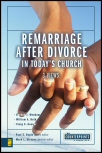
Among born-again Christians, 27 percent have experienced divorce as compared to 24 percent in the general population. Yet no consensus exists among evangelicals on their views of remarriage, leaving many Christians confused. This single volume summarizes and explores three main evangelical views: no remarriage, remarriage after adultery or desertion, and remarriage for a variety of reasons. Each of the three contributors offers his point of view succinctly with biblical support, and each interacts with the others to help readers come to their own conclusions.
Contributors and contents:
- “No Remarriage After Divorce,” by Gordon J. Wenham
- “Remarriage (two grounds),” by William A. Heth
- “Remarriage (variety of reasons),” by Craig S. Keener
Mark Strauss is professor of New Testament at Bethel Seminary in San Diego. He has written The Davidic Messiah in Luke-Acts, Distorting Scripture?, The Challenge of Bible Translation and Gender Accuracy, and Luke in the Zondervan Illustrated Bible Background Commentary series. Forthcoming books include The Gospels and Jesus, Mark in the revised Expositor’s Bible Commentary series, and Mark in the Zondervan Exegetical Commentary series.
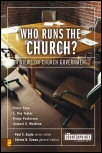
Churches have split and denominations have formed over the issue of church government. Yet while many Christians can explain their particular church’s form of rule and may staunchly uphold it, few have a truly biblical understanding of it. What model for governing the church does the Bible provide? Is there room for different methods? Or is just one way the right way? In Who Runs the Church? four predominant approaches to church government are presented by respected proponents.
Contents and contributors:
- “Episcopalianism,” by Peter Toon
- “Presbyterianism,” by L. Roy Taylor
- “Single-Elder Congregationalism,” by Paige Patterson,
- “Plural-Elder Congregationalism,” by Samuel E. Waldron
Steven B. Cowan (MDiv, PhD) is associate professor of philosophy and apologetics at Southeastern Bible College in Birmingham, Alabama.
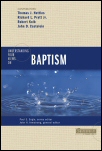
What is the significance of water baptism? Who should be baptized? Is infant baptism scriptural? Which is the proper baptismal mode: sprinkling, pouring, or immersion? Should people be re-baptized if they join a church that teaches a different form of baptism? Should baptism be required for church membership? These and other questions are explored in this thought-provoking book.
Contents and contributors:
- “Baptist View: Baptism as a Symbol of Christ’s Saving Work,” by Thomas J. Nettles
- “Reformed View: Baptism as a Sacrement of the Covenant,” by Richard L. Pratt Jr.
- “Lutheran View: God’s Baptismal Act as Regenerative,” by Robert Kolb
- “Christian Churches/Churches of Christ View: Believers’ Baptism as the Biblical Occasion of Salvation,” by John D. Castelein
John H. Armstrong is president of ACT 3 in Carol Stream, Illinois and served as a pastor for more than 20 years. He is an adjunct professor of evangelism at Wheaton College Graduate School. His online commentaries regularly appear at www.Act3online.com. He holds degrees from Wheaton College, Wheaton Graduate School, and Luther Rice Seminary. He is the author or editor of a number of books including The Catholic Mystery, Five Great Evangelists, and Understanding Four Views on the Lord’s Supper.
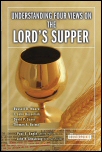
Who should participate in the Lord’s Supper? How frequently should we observe it? What does this meal mean? What happens when we eat the bread and drink from the cup? What do Christians disagree about and what do they hold in common? This volume in the Counterpoints: Church Life series allows four contributors to make a case for the following views: Baptist, Reformed, Lutheran, and Roman Catholic.
Contents and contributors:
- “Baptist View: Christ’s Presence as a Memorial,” by Russell D. Moore
- “Reformed View: The Real Presence of Christ,” by I. John Hesslink
- “Lutheran View: Finding the Right Word,” by David P. Scaer
- “Roman Catholic View: Christ’s True, Real, and Substantial Presence,” by Thomas A. Baima
John H. Armstrong is president of ACT 3 in Carol Stream, Illinois and served as a pastor for more than 20 years. He is an adjunct professor of evangelism at Wheaton College Graduate School. His online commentaries regularly appear at www.Act3online.com. He holds degrees from Wheaton College, Wheaton Graduate School, and Luther Rice Seminary. He is the author or editor of a number of books including The Catholic Mystery, Five Great Evangelists, and Understanding Four Views on Baptism.
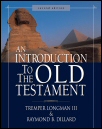
This second edition of An Introduction to the Old Testament integrates and interacts with recent developments in Old Testament scholarship. It has been revised and updated to reflect recent advances in Old Testament scholarship. An upper-level introduction that includes callouts, charts, and graphs, it offers a solid understanding of three key issues: historical background, literary analysis, and theological message.
Raymond B. Dillard was professor of Old Testament language and literature at Westminster Theological Seminary.
Tremper Longman III is an Old Testament scholar and award-winning author. He earned degrees from Ohio Wesleyan University, Westminster Theological Seminary, and Yale University. He taught for 18 years at Westminster in Philadelphia before becoming a professor of biblical studies and chair of the religious studies department at Westmont College.
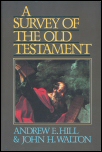
The purpose of studying the Old Testament is to understand God and his redemptive work more fully. However, this goal is complicated by the fact that it was transmitted through a very different language and culture from our own. A Survey of the Old Testament provides an indispensable guide for undergraduate students and other readers by exploring the literary, historical, and theological issues behind the Old Testament and its various books.
For each Old Testament book, the Survey addresses background information, purpose, message, structure, and major themes. Chapters introducing each major section of the Old Testament are included, as are chapters dealing with issues of interpretation, geography, archaeology, history, formation of the Old Testament canon, and the Old Testament’s relationship to the New Testament. The text is enhanced throughout by maps, photos, timelines, and charts. This full-color third edition of a widely acclaimed textbook has been expanded and redesigned in both text and graphical elements, making it even more beneficial.
Andrew E. Hill PhD, University of Michigan) is professor of Old Testament studies at Wheaton College in Illinois. He is the author of Malachi in the Anchor Bible commentary series. His articles have appeared in such scholarly publications as Hebrew Annual Review, Journal of Biblical Literature, and Vetus Testamentum.
John H. Walton (PhD, Hebrew Union College) is professor of Old Testament at Wheaton College Graduate School. He is the author or co-author of several books, including Chronological and Background Charts of the Old Testament; Ancient Israelite Literature in Its Cultural Context; Covenant: God’s Purpose, God’s Plan; and The IVP Bible Background Commentary: Old Testament.
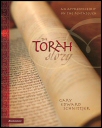
Working knowledge of the Torah is essential for every serious student of the Scriptures. Written in an engaging and accessible voice, even while digging into difficult and complicated matters at a sophisticated level, The Torah Story emphasizes the content of the text itself, moving beyond debating dates and theories of authorship into understanding how these five key books of the Bible help us understand the story of salvation. Providing flexible options for further study, each chapter includes the following:
- Tips and tools for getting started
- Questions that focus on key issues Key terms to look for
- Outlines and summaries of the material
- An interactive workshop designed for students, individuals, or study groups
- Challenge questions drawn from the chapter and biblical text
- Advanced questions for those who want deeper exploration of biblical contexts, language, and exegetical or theological issues
- Research project suggestions
- Discussion activities using films to engage the biblical narrative
Andrew E. Hill PhD, University of Michigan) is professor of Old Testament studies at Wheaton College in Illinois. He is the author of Malachi in the Anchor Bible commentary series. His articles have appeared in such scholarly publications as Hebrew Annual Review, Journal of Biblical Literature, and Vetus Testamentum.
John H. Walton (PhD, Hebrew Union College) is professor of Old Testament at Wheaton College Graduate School. He is the author or co-author of several books, including Chronological and Background Charts of the Old Testament; Ancient Israelite Literature in Its Cultural Context; Covenant: God’s Purpose, God’s Plan; and The IVP Bible Background Commentary: Old Testament.
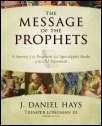
Christians sometimes approach the Old Testament with a mixture of awe and bewilderment, knowing that it contains pearls of wisdom, but unsure how to dive for them—especially when it comes to the Prophets. In The Message of the Prophets, author J. Daniel Hays offers a scholarly, yet readable and student-friendly survey of the Old Testament prophetic literature that presents the message of each prophet in its historical and its biblical context and then tracks that message through the New Testament to challenge readers with what it means for them today.
Hays focuses on synthesizing the message of the prophets, which enables students to grasp the major contours of the prophetic books clearly and concisely. Hundreds of colorful pictures help to illustrate the historical and cultural background of the prophets. After identifying what the message meant for ancient Israel, Hays helps the readers to move toward theological application today, helping readers to gain a better understanding of God and the relationship between God and his people. The Message of the Prophets is essential for professors, students, and others seeking to understand the role that the Old Testament prophets play in the Christian faith.
J. Daniel Hays is dean of the Pruet School of Christian Studies and professor of Old Testament at Ouachita Baptist University. He is the author of From Every People and Nation, and he has co-authored Grasping God’s Word; Preaching God’s Word; Journey into God’s Word; The Story of Israel: A Biblical Theology; Iraq: Babylon of the End Times?; Apocalypse; and The Dictionary of Biblical Prophecy. He teaches adult Sunday school at his local church in Arkadelphia, Arkansas, and preaches frequently throughout the nation.
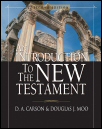
An Introduction to the New Testament focuses on “special introduction” that is historical questions dealing with authorship, date, sources, purpose, destination, and so forth. This approach stands in contrast to recent texts that concentrate more on literary form, rhetorical criticism, and historical parallels—topics the authors don’t minimize, but instead think are better given extended treatment in exegesis courses. By refocusing on the essentials, An Introduction to the New Testament ensures that the New Testament books will be accurately understood within historical settings. For each New Testament document, the authors also provide a substantial summary of that book’s content, discuss the book’s theological contribution to the overall canon, and give an account of current studies on that book, including recent literary and social-science approaches to interpretation.
[. . . . ]highly recommended. With its very careful, keenly nuanced, and extensively researched discussions, it may well be considered special in a way not originally intended by its authors. It deserves to be read not just by students but by all scholars of the New Testament.
D. A. Carson is research professor of New Testament at Trinity Evangelical Divinity School in Deerfield, Illinois. He is the author or co-author of over 50 books, including the Gold Medallion Award-winning book The Gagging of God.
Douglas Moo is the Blanchard Professor of New Testament at Wheaton College. His work centers on understanding the text of the New Testament and its application today. He has written extensively in several commentary series, including the NIV Application Commentary and the Pillar Commentary.
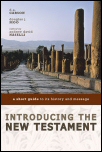
This abridged edition of an established major textbook brings the best of New Testament scholarship to the church and makes it accessible to the average reader. Focusing on historical questions dealing with authorship, date, sources, purpose, and destination of the New Testament books, this book will help a new generation of students and church leaders better grasp the message of the New Testament.
This book focuses on historical questions dealing with authorship, date, sources, purpose, and destination of the New Testament books. By focusing on the essentials, the authors ensure that each book is accurately understood within its historical settings. For each New Testament document, the authors also provide a summary of that book’s content and discuss the book’s theological contribution to the overall canon.
D. A. Carson is research professor of New Testament at Trinity Evangelical Divinity School in Deerfield, Illinois. He is the author or co-author of over 50 books, including the Gold Medallion Award-winning book The Gagging of God.
Douglas Moo is the Blanchard Professor of New Testament at Wheaton College. His work centers on understanding the text of the New Testament and its application today. He has written extensively in several commentary series, including the NIV Application Commentary and the Pillar Commentary.
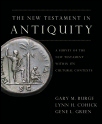
The New Testament in Antiquity is a textbook for college and seminary students penned by three evangelical scholars with over 50 years of combined experience in the classroom. Their challenge was to build a text that would be engaging, academically robust, richly illustrated, and relevant to the modern student. This book strikes a balance between being accessible to all students and challenging them to explore the depths of the New Testament within its cultural worlds.
This volume carefully develops how Jewish and Hellenistic cultures formed the essential environment in which the New Testament authors wrote their books and letters. It argues that knowing the land, history, and culture of this world brings remarkable new insights into how we read the New Testament itself. Numerous sidebars provide windows into the Jewish, Hellenistic, and Roman worlds and integrate this material directly with the interpretation of the literature of the New Testament. This is an ideal introductory text for classroom use, with ample discussion questions and bibliographies.
Gary M. Burge is a professor of New Testament in the Department of Biblical and Theological Studies at Wheaton College and Graduate School. Gary has authored a number of books, including Who Are God’s People in the Middle East? What Christians Are Not Being Told About Israel and the Palestinians.
Lynn H. Cohick is associate professor of New Testament in the Department of Biblical and Theological Studies at Wheaton College and Graduate School, Wheaton, Illinois.
Gene L. Green is Professor of New Testament at Wheaton College and Graduate School. Before coming to Wheaton in 1996, he served for over a decade as professor of New Testament as well as academic dean and rector of the Seminario ESEPA in San José, Costa Rica.
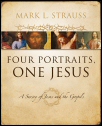
To Christians worldwide, the man Jesus of Nazareth is the centerpiece of history, the object of faith, hope, and worship. Even those who do not follow him admit the vast influence of his life. For anyone interested in knowing more about Jesus, study of the four biblical Gospels is essential.
Four Portraits, One Jesus is a thorough yet accessible introduction to these documents and their subject, the life and person of Jesus. Like different artists rendering the same subject using different styles and points of view, the Gospels paint four highly distinctive portraits of the same remarkable Jesus.
Mark Strauss is professor of New Testament at Bethel Seminary in San Diego. He has written The Davidic Messiah in Luke-Acts, Distorting Scripture?, The Challenge of Bible Translation and Gender Accuracy, and Luke in the Zondervan Illustrated Bible Background Commentary series. Forthcoming books include The Gospels and Jesus, Mark in the revised Expositor’s Bible Commentary series, and Mark in the Zondervan Exegetical Commentary series.
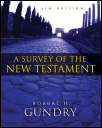
This revised edition of Robert H. Gundry’s survey of the New Testament goes beyond providing background information and technical introductory material and leads students to read the New Testament itself. Whenever possible general questions of introduction and background are tied to assigned readings covering the entire New Testament. In addition, comments on these readings help students with interpretation and follow the flow of thought from one passage to another.
Robert H. Gundry is a scholar-in-residence and professor emeritus of New Testament and Greek at Westmont College in Santa Barbara, California. Among his books are Mark: A Commentary on His Apology for the Cross; Matthew: A Commentary on His Handbook for a Mixed Church Under Persecution, Soma in Biblical Theology, and Jesus the Word According to John the Sectarian.
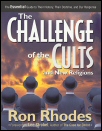
In this essential resource, preeminent cult authority Ron Rhodes explains what cults are, why they are cause for concern, and why in the 21st century, as never before, their numbers and memberships are exploding nationally and worldwide. Drawing on his extensive experience as a cult researcher, Rhodes offers to-the-point, cutting-edge information on 12 major cults and new religions.
Ron Rhodes is the president of Reasoning from the Scriptures Ministries. He is the author of 18 books, including two Silver Medallion Award winners. He is heard nationwide on radio.
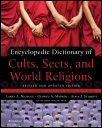
Encyclopedic Dictionary of Cults, Sects, and World Religions is arguably the most significant reference book on the subject to be published. Formerly titled Dictionary of Cults, Sects, Religions, and the Occult, it provides reliable information on the history and beliefs of nearly every form of religion active today. This extensively revised edition includes new topics, updated information, and a brand-new format for a clearer, more organized approach.
Larry A. Nichols is the pastor of Our Redeemer Evangelical Lutheran Church in Greenville, Rhode Island. He is co-author of Masonic Lodge in the Zondervan Guide to Cults and Religious Movements.
George A. Mather is the pastor of Our Savior Lutheran Church in St. George, Utah, and is the co-author of Encyclopedia Dictionary of Cults, Sects, and World Religions.
Alvin J. Schmidt retired in 1999 as professor of sociology at Illinois College in Jacksonville, Illinois, where he still lives. He is the author of several books, including The Great Divide: The Failure of Islam and the Triumph of the West, and served as a consulting editor for Dictionary of Cults, Sects, Religions and the Occult.
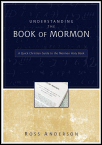
A former Mormon and an adult convert to Christianity, author Ross Anderson provides a clear summary of the Book of Mormon including its history, teachings, and unique features. Stories from the author and other ex-Mormons illustrate the use of Mormon scripture in the Latter-day Saint church. Anderson gives special attention to how the Book of Mormon relates to Christian beliefs about God, Jesus, and the Bible.
Ross Anderson is the founding pastor of Wasatch Evangelical Free Church in Roy, Utah, where he has served since graduating from seminary in 1983. He was born in Utah and raised in California as an active member of the Mormon Church. He is passionate about incorporating ex-Mormons into the Church.
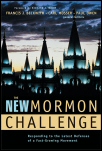
Written by an international team of respected Christian scholars, this freshly researched rebuttal of Mormon truth will aid those sharing the Gospel with Mormons and those investigating Mormonism on their own. It will help readers to accurately understand Mormonism through biblical, historical, scientific, philosophical, and theological discussions.
I applaud the sensitivity and understanding invested in this enormous work.
—Ravi Zacharias
Francis J. Beckwith is professor of philosophy and church-state studies, and codirector of the program in philosophical studies of religion in the Institute for Studies of Religion, at Baylor University in Waco, Texas. A graduate of Fordham University and the Washington University School of Law, St. Louis, his books include Law, Darwinism, and Public Education: The Establishment Clause ad the Challenge of Intelligent Design, To Everyone An Answer: A Case for the Christian Worldview, and Do the Right Thing: Readings in Applied Ethics & Social Philosophy.
Carl Mosser has published significant articles on Mormonism in both evangelical and Mormon journals.
Paul Owen is assistant professor of Bible and religion at Montreat College. He has published significant articles on Mormonism in both evangelical and Mormon journals. He lives in Asheville, North Carolina.
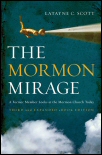
In the first edition of The Mormon Mirage, Latayne C. Scott shared her remarkable journey out of Mormonism as she uncovered shocking inaccuracies, inconsistencies, and contradictions in the faith she had loved and lived. 30 years later, Mormonism and Mormon scholarship have evolved with the times. In this third, revised and updated edition of her well-known book, Scott keeps pace with changes and advances in Mormonism, and reveals formidable new challenges to its claims and teachings.
I applaud the sensitivity and understanding invested in this enormous work.
—Ravi Zacharias
Latayne C. Scott was Mormon for 10 years, attending Brigham Young University on a writing scholarship and working as a staff member for two of BYU’s weekly magazines. She is the author of 14 published books, including Latter-Day Cipher, Why We Left Mormonism, and The Hinge of Your History: The Phases of Faith. She has also published articles and poems in secular magazines and in major Christian magazines, and she is the recipient of Pepperdine University’s “Distinguished Christian Service Award” for her writing.
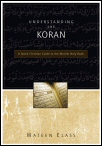
This volume is a quick non-technical, introduction to the Koran designed to help Christians understand a hidden book revered by 1.3 billion Muslims, covering the background on its writing, a summary of its contents, a perspective on how it’s used and viewed by Muslims, a comparison of differences and similarities to the Bible, and some suggestions on how it should and should not be used in conversations with Muslims. Find out how the Koran resembles the Bible—and the drastic ways in which it differs. Understanding the Koran gives you a fascinating essential grasp of Islam’s holy book: where it came from, what it teaches, how Muslims view it, and how the Allah of the Koran compares with the God of the Bible.
Mateen Elass was raised in Saudi Arabia in a Muslim environment. He holds degrees from Stanford University, Fuller Theological Seminary, and a PhD from the University of Durham in England. He has served in a church in Colorado and currently serves as senior pastor of a Presbyterian church in the Midwest. He has written feature articles for Moody magazine, including “What Muslims Think of America.”
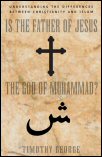
Today as never before, the world’s second largest religion is shaping our culture, and words such as jihad, imam, Quran, and fatwa have entered our vocabulary. While all Muslims are no more alike than all Christians are alike, there are certain fundamental beliefs that all Muslims hold in common—some of which Christians would agree with, including belief in one true God. But is it the same God? How does the God of Muhammad differ from the God of Christianity?
Written in a clear, passionate style that is conciliatory, balanced, and uncompromisingly biblical, this book describes and contrasts the distinctives of Christianity and Islam. Its author, a noted historian and theologian who has studied Islam for many years, writes with an eye on helping Christians better understand how to interact with Muslims.
Timothy George is the founding dean of Beeson Divinity School of Samford University. An executive editor of Christianity Today, Timothy George has written more than 20 books and regularly contributes to scholarly journals.
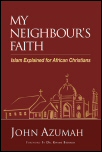
Nowhere else in the world have both Islam and Christianity been more instrumental in shaping the history of a people and their way of life than in Africa. African Muslims and Christians have a lot in common, including kinship ties, shared languages and citizenship. Yet, despite the centuries of deep historical links and harmonious existence between the two religions, new challenges threaten this harmony. Conflicts involving Christians and Muslims in places like Sudan, Nigeria and Ivory Coast are common. These conflicts are fueled primarily by ignorance, stereotyping and prejudice, which in turn breed fear, suspicion and even hatred, in some cases leading to violence.
My Neighbour’s Faith sheds light on the beliefs and teaching of Islam by addressing matters of contemporary importance to Christians and the wider non-Muslim audience. It presents the human face of Islam—the face of a close relative, a neighbour, a teacher and even a head of state—in a balanced and critical way that gives a credible view of Islam.
John Azumah holds a PhD in Islamics from the University of Birmingham, UK, and is the Director for the Centre of Islamic Studies at the London School of Theology. He has previously served as a research fellow with the Akrofi-Christaller Institute in Ghana. Dr. Azumah is the author of The Legacy of Arab-Islam in Africa: A Quest for Inter-Religious Dialogue and has written articles on the subject in various academic journals.
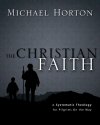
Michael Horton’s highly anticipated The Christian Faith represents his magnum opus and will be viewed as one of—if not—the most important systematic theologies since Louis Berkhof wrote his in 1932. A prolific, award-winning author and theologian, Professor Horton views this volume as “doctrine that can be preached, experienced, and lived, as well as understood, clarified, and articulated.” It is written for a growing cast of pilgrims making their way together and will be especially welcomed by professors, pastors, students, and armchair theologians.
Features of this volume include:
- A brief synopsis of biblical passages that inform a particular doctrine
- Surveys of past and current theologies with contemporary emphasis on exegetical, philosophical, practical, and theological questions
- Substantial interaction with various Christian movements within the Protestant, Catholic, and Orthodoxy traditions, as well as the hermeneutical issues raised by postmodernity
- Charts, sidebars, questions for discussion, and an extensive bibliography, divided into different entry levels and topics
In this impressive volume, Michael Horton . . . remits and rethinks the greatness of seventeenth-century Reformed theology and makes it accessible for readers today.
—George Hunsinger, Professor of Systematic Theology, Princeton Theological Seminary
The Christian Faith is a remarkable accomplishment—the most significant single-volume systematic theology to be written in decades! This book is written for the sake of the church, yet it also reflects a fresh engagement with a broad range of biblical and theological scholarship. The Christian Faith is an excellent resource for all who wish to engage classical Christian theology in a Reformed key.
—J. Todd Billings, Associate Professor, Western Theological Seminary
This is a work of outstanding theological and spiritual cogency and will command wide attention.
—John Webster, Chair of Systematic Theology, King’s College, University of Aberdeen
Michael Horton’s awareness of modern theological and philosophical currents combines with his articulate commitment to historical orthodoxy to make this book one of the most significant voices to be heard in framing a systematic theology for this generation of the Reformed movement.
—Bryan Chapell, distinguished professor of preaching, Knox Theological Seminary
Horton’s Christian Faith has the great merit of never letting the reader forget that doctrine is for disciples who want to walk the way of Jesus Christ. Horton knows that the best systematic theology is a practical theology—one that helps us understand the ways of God, make sense of life, and give direction for God-glorifying living.
—Kevin J. Vanhoozer, Professor of Theology, Wheaton College and Graduate School
. . . offers a fine, comprehensive companion to a number of recent systematic theologies. Crisply written, scripturally informed throughout, distinctively evangelical and Reformed, conversant with classic as well as contemporary Christian authors—Horton’s study is an outstanding contribution that will richly nourish Christian pilgrims on their way toward the consummation of Christ’s kingdom.
—Cornelis P. Venema, President, Mid-America Reformed Seminary
A crisp, clear, and forceful new theology that is at once biblical and reverent, historical and contemporary, learned but accessible. What a great gift this is to the church!
—David F. Wells, Distinguished Research Professor, Gordon-Conwell Theological Seminary
Dr. Horton has produced a remarkable work. His approach to systematic theology is fresh and critically needed in our time. Every pilgrim will profit from this work.
—R. C. Sproul, Chairman and President, Ligonier Ministries
Michael S. Horton (PhD, University of Coventry and Wycliffe Hall, Oxford) is J. Gresham Machen Professor of Systematic Theology and Apologetics at Westminster Seminary California. A Reformed minister, he also co-hosts the White Horse Inn and is editor of Modern Reformation magazine. Horton has authored more than twenty books.
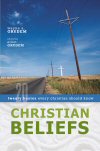
God doesn’t call every Christian to go off to seminary, but there are certain matters of doctrine—that is, the church’s teaching—that every Christian simply must know. Theology is important because what we believe affects how we live. If you’re a relatively new believer in Jesus, or if you’re a more mature Christian looking for a quick brush-up on basics of the faith, Christian Beliefs is for you.
This readable guide to twenty basic Christian beliefs is a condensation of Wayne Grudem’s award-winning book on systematic theology, prized by pastors and teachers everywhere. He and his son, Elliot, have boiled down the essentials of Christian theology for the average layperson and made them both clear and applicable to life. You will learn about the Bible, the characteristics of God, what it means that we are created in the image of God, what God has done for us in Christ, the purpose of the church, and much more. Each chapter includes questions for personal review or group discussion.
These truly are twenty basic beliefs that every Christian should know. Wayne Grudem is a master teacher with the ability to explain profound truths in simple language. He is a man of deep conviction and theological passion—and those who read this book will be both educated and encouraged in the faith.
—R. Albert Mohler Jr., President, The Southern Baptist Theological Seminary
. . . this summary will certainly help beginners with Christ to get the hang of their faith.
—J. I. Packer, Executive Editor, Regent College
As Wayne Grudem’s Systematic Theology contracts into a compact book, I do not lose my enthusiasm for the truth he loves and the clarity of his words.
—John Piper, Author and Theologian, Bethlehem Baptist Church
Wayne Grudem is Research Professor of Theology and Biblical Studies at Phoenix Seminary in Phoenix, Arizona. He holds degrees from Harvard (AB), Westminster Theological Seminary (MDiv, DD), and Cambridge (PhD). He is the author of more than a dozen books including the bestselling Systematic Theology.
Elliot Grudem is Senior Minister at Christ the King Presbyterian Church (PCA) in Raleigh, North Carolina.
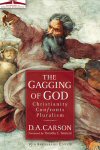
This Gold Medallion Award-winning book presents a persuasive case for Christ as the only way to God. Is Jesus the only way to God? This clear, critically-acclaimed, scholarly response to that question affirms the deep need for the Gospel’s exclusive message in today’s increasingly pluralistic global community. The Gagging of God offers an in-depth look at the big picture, shows how the many ramifications of pluralism are all parts of a whole, and then provides a systematic Christian response.
The Gagging of God is divided into four parts:
- Part One looks at the history of pluralism, especially the revolution in hermeneutics, literary theory, and epistemology.
- Part Two addresses religious pluralism, notably the work of John Hick and David Tracy, and of inclusivists such as Clark Pinnock and John Sanders. It argues for the Bible’s foundational “plotline,” and addresses the uniqueness of Christ.
- Part Three analyzes the Christian’s stance in a pluralistic culture across such diverse fields as education, law, and morals.
- Part Four looks at how pluralism has penetrated the evangelical camp and offers a thoughtful look at how to evangelize in a postmodern generation.
The Gagging of God makes a tremendous contribution . . . highly recommended.
—Evangelical Journal
. . . on the issues of pluralism, postmodernism, and biblical interpretation, it is a splendid resource.
—Patrick Rist, Faculty Commons
D. A. Carson (PhD, University of Cambridge) is Research Professor of New Testament at Trinity Evangelical Divinity School in Deerfield, Illinois. He is the author or coauthor of over fifty books. He is General Editor of Telling the Truth: Evangelizing Postmoderns and Worship by the Book. He has served as a pastor and is an active guest lecturer in church and academic settings around the world.
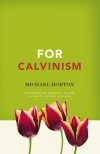
The system of theology known as Calvinism has been immensely influential for the past five hundred years, but it is often encountered negatively as a fatalistic belief system that confines human freedom and renders human action and choice irrelevant. Taking us beyond the caricatures, Michael Horton invites us to explore the teachings of Calvinism, also commonly known as Reformed theology, by showing us how it is biblical and God-centered, leading us to live our lives for the glory of God.
Horton explores the historical roots of Calvinism, walking readers through the distinctive known as the “Five Points,” and encouraging us to consider its rich resources for faith and practice in the twenty-first century. As a companion to Roger Olson’s Against Calvinism, readers will be able to compare contrasting perspectives and form their own opinions on the merits and weaknesses of Calvinism.
Michael S. Horton (PhD, University of Coventry and Wycliffe Hall, Oxford) is the J. Gresham Machen Professor of Systematic Theology and Apologetics at Westminster Seminary California. A Reformed minister, he also co-hosts the White Horse Inn and is editor of Modern Reformation magazine. Horton has authored more than twenty books.
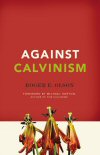
Calvinist theology has been debated and promoted for centuries. But is it a theology that should last? Roger Olson suggests that Calvinism, also commonly known as Reformed theology, holds an unwarranted place in our list of accepted theologies. In Against Calvinism, readers will find scholarly arguments explaining why Calvinist theology is incorrect and how it affects God’s reputation.
Olson draws on a variety of sources, including Scripture, reason, tradition, and experience, to support his critique of Calvinism and the more historically rich, biblically faithful alternative theologies he proposes. Addressing what many evangelical Christians are concerned about today—so-called “new Calvinism,” a movement embraced by a generation labeled as “young, restless, and Reformed”—Against Calvinism is the only book of its kind to offer objections from a non-Calvinist perspective to the current wave of Calvinism among Christian youth. As a companion to Michael Horton’s For Calvinism, readers will be able to compare contrasting perspectives and form their own opinions on the merits and weaknesses of Calvinism.
Roger E. Olson (PhD, Rice University) is Professor of Theology at George W. Truett Theological Seminary of Baylor University. He is the author of many books, including Questions to All Your Answers: The Journey from Folk Religion to Examined Faith, Reformed and Always Reforming: The Postconservative Approach to Evangelical Theology, and How to Be Evangelical without Being Conservative.
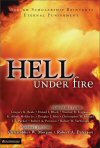
Of all the teachings of Christianity, the doctrine of hell is easily the most troubling, so much so that in recent years the church has been quietly tucking it away. Rarely mentioned anymore in the pulpit, it has faded through disuse among evangelicals and been attacked by liberal theologians. Hell is no longer only the target of those outside the church. Today, a disturbing number of professing Christians question it as well.
Perhaps more than at any other time in history, hell is under fire. The implications of the historic view of hell make the popular alternatives, annihilationism and universalism, seem extremely appealing. But the bottom line is still God’s Word. What does the Old Testament reveal about hell? What does Paul the apostle have to say, or the book of Revelation? Most important, what does Jesus, the ultimate expression of God’s love, teach us about God’s wrath?
Upholding the authority of Scripture, the different authors in Hell under Fire explore a complex topic from various angles. R. Albert Mohler Jr. provides a historical, theological, and cultural overview of “The Disappearance of Hell.” Christopher Morgan draws on the New Testament to offer three pictures of hell as punishment, destruction, and banishment. J. I. Packer compares universalism with the traditional understanding of hell, Morgan does the same with annihilationism, and Sinclair Ferguson considers how the reality of hell ought to influence preaching.
These examples offer some idea of this volume’s scope and thoroughness. Hell may be under fire, but its own flames cannot be quenched by popular opinion. This book helps us gain a biblical perspective on what hell is and why we cannot afford to ignore it. And it offers us a better understanding of the One who longs for all people to escape judgment and obtain eternal life through Jesus Christ.
This collection of essays plumbs the deep things of God with clarity, care, and conviction. We see how God is glorified when truth is put forever on the throne and evil on the scaffold.
—David F. Wells, Andrew Mutch Distinguished Professor of Historical and Systematic Theology, Gordon-Conwell Theological Seminary
One of the strongest and most useful biblical and theological assessments of the doctrine of hell over its ancient and modern detractors. There is hardly anything to match either the scope of its argument or the incisiveness of its thought in the last several decades!
—Walter C. Kaiser Jr., President, Gordon-Conwell Theological Seminary
Hell under Fire confronts the strongest arguments against hell fairly, clearly, and with pastoral sensitivity. The authors refuse even for a moment to beat around the bush with vague platitudes. They return again and again to the deeply disturbing but clear teaching of Scripture that hell does exist, and that it is a place of eternal punishment. This is a sobering, persuasive, much-needed book.
—Wayne Grudem, Research Professor of Bible and Theology, Phoenix Seminary
Christopher W. Morgan is Professor of Theology and Dean of the School of Christian Ministries at California Baptist University in Riverside, California. Author/editor of ten books and a teaching pastor of Helendale Community Church, he and his wife, Shelley, have been married for twenty years and live in Helendale, California.
Robert A. Peterson is Professor of Systematic Theology at Covenant Theological Seminary in St. Louis, Missouri. He is author or editor of twenty books, including Salvation Accomplished by the Son: The Work of Christ and Our Secure Salvation: Preservation and Apostasy.
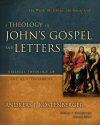
In A Theology of John’s Gospel and Letters, building on many years of research and study in Johannine literature, Andreas Köstenberger not only furnishes an exhaustive theology of John’s Gospel and letters, but also provides a detailed study of major themes and relates them to the Synoptic Gospels and other New Testament books. Readers will gain an in-depth and holistic grasp of Johannine theology in the larger context of the Bible.
. . . for the comprehensiveness of its coverage in the field of Johannine theology (Gospel and Letters), there is nothing to compare to this work.
—D. A. Carson, Research Professor of New Testament, Trinity Evangelical Divinity School
. . . the first major volume to be devoted specifically to the theology of John’s Gospel and Letters at a high academic level; and the first volume to do so on the basis that here we have an interpretation of John’s theology composed by an eyewitness of the life and passion of Jesus.
—I. Howard Marshall, Honorary Research Professor of New Testament, University of Aberdeen
Massive and masterful, [it] presents Johannine theology in encyclopedic fullness . . . a new benchmark in synthetic treatment.
—Robert W. Yarbrough, Professor of New Testament, Covenant Theological Seminary
Andreas Köstenberger is Director of PhD Studies and Professor of New Testament and Biblical Theology at Southeastern Baptist Theological Seminary in Wake Forest, North Carolina. He is the author of numerous works on John, including his commentary in the Baker Exegetical Commentary on the New Testament series, John in Commentary on the New Testament Use of the Old Testament, and John in Zondervan Illustrated Bible Backgrounds Commentary.
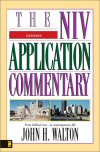
The Bible begins and ends with a revelation of God that gives redemption its basis. From the first verse of Genesis, the book of origins, we encounter a God of personality, character, purpose, and activity. Only in the light of what He shows us of Himself as the Creator of our world and the Interactor with human history does the salvation story assume its proper context. Genesis sets things in order: God first, then us.
In the words of the general editor’s preface, “Especially after the Tower of Babel it became evident that people had forgotten who God was. They needed reminding. The moves God made were essentially concerned with putting himself in front of the world’s peoples.” Today, perhaps more than ever, we need God to put himself in front of us—to remind us who He is, and that He is.
With characteristic creativity and uncommon depth, John H. Walton demonstrates the timeless relevance of Genesis. Revealing the links between Genesis and our own times, Dr. Walton shows how this mysterious, often baffling book filled with obscure peoples and practices reveals truth to guide our twenty-first-century lives.
John H. Walton (PhD, Hebrew Union College) is Professor of Old Testament at Wheaton College Graduate School. He is the author or coauthor of several books, including Chronological and Background Charts of the Old Testament, Ancient Israelite Literature in Its Cultural Context, Covenant: God’s Purpose, God’s Plan, The IVP Bible Background Commentary: Old Testament, and A Survey of the Old Testament.
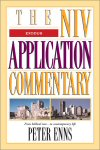
Exodus helps readers learn how the message of Exodus can have the same powerful impact today that it did when it was first written.
Dr. Peter E. Enns is a Reformed Evangelical Christian and a biblical scholar. He is a frequent contributor to journals and encyclopedias, and the author of several books, including Inspiration and Incarnation: Evangelicals and the Problem of the Old Testament.
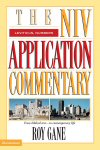
The books of Leviticus and Numbers spell out God’s legal requirements for ancient Israel. But that was over three millennia ago. Now that we’re under a new covenant of grace, how do strange laws and obscure, seemingly trifling details regarding everything from temple sacrifice to household mold have any bearing on us today? If the Law was perfectly fulfilled in Jesus, why bother studying arcane regulations that no longer apply?
Because they do apply. Their original contexts may have disappeared, but the principles behind them are fraught with relevance. Moreover, in our individualistic—and selfish—culture, they restore to us a God’s eye vision that extends beyond ourselves to the church as community.
Exploring the links between the Bible and our own times, Roy Gane shares perspectives on Leviticus and Numbers that reveal their enduring relevance for our twenty-first-century lives.
Roy Gane (PhD, University of California, Berkeley) is Professor of Hebrew Bible and Ancient Near Eastern Languages at the Theological Seminary of Andrews University. He is author of a number of scholarly articles and several books including God’s Faulty Heroes, Altar Call, Ritual Dynamic Structure, and Cult and Character: Purification Offerings, Day of Atonement, and Theodicy, as well as the Leviticus portion of the Zondervan Illustrated Bible Backgrounds Commentary on the Old Testament.
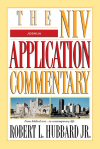
Reading Joshua can be, frankly, a jarring experience. Serious, troubling questions about God’s attitude toward his created peoples arise, questions with no easy answer. But the book of Joshua presents itself, warts (and wars!) and all, and asks readers to let it tell its story from its point of view and out of its ancient context. It asks them to give it the benefit of the doubt and permit it to speak to them.
This commentary aims to give its voice a clear hearing—to translate its ancient cultural form in such a way that it freely speaks about the life of faith today. Basically, the book of Joshua tells how biblical Israel navigated a major historical transition early in its national life. The book shows that guiding these changes is Israel’s God, Yahweh, through his chosen servant, Joshua. The introductory sections to follow set the scene for entering the book of Joshua and the ancient world about which it reports. Joshua helps readers learn how the message of Joshua can have the same powerful impact today that it did when it was first written.
Robert L. Hubbard Jr. (PhD, Claremont Graduate School) is Professor of Biblical Literature at North Park Theological Seminary in Chicago, IL. He also taught at Denver Seminary and served as a chaplain on active duty in the United States Navy and in the United States Naval Reserve. Dr. Hubbard is author of The Book of Ruth: New International Commentary on the Old Testament, which received the Christianity Today Critics Choice Award as the best commentary of 1989. He co-authored Introduction to Biblical Interpretation, with William Klein and Craig Blomberg, and is currently writing commentaries on Esther and Lamentations for the New International Commentary on the Old Testament, a series on which he serves as General Editor.
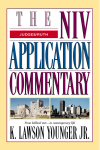
The concept of judgment is at odds with today’s culture, which considers it a sin to suggest there is such a thing as sin. Perhaps that is partly because we have seen all too clearly the fallibility of those who judge. What many of us long for is not judgment but righteousness and deliverance from oppression. That is why the books of Judges and Ruth are so relevant today: Judges, because it reveals a God who employs very human deliverers but refuses to gloss over their sins and the consequences of those sins; and Ruth, because it demonstrates the far-reaching impact of a righteous character. Exploring the links between the Bible and our own times, Dr. K. Lawson Younger Jr. shares literary perspectives on the books of Judges and Ruth that reveal ageless truths for our twenty-first-century lives.
K. Lawson Younger Jr. (PhD, University of Sheffield) is Professor of Old Testament, Semitic Languages, and Ancient Near Eastern History at Trinity Evangelical Divinity School in Deerfield, IL. He is the author, associate editor, and coeditor of several books, and has contributed to numerous collections of essays, dictionaries, and periodicals.
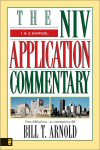
Why do the books of Samuel pack such broad appeal? Taken together as a single narrative, they certainly offer something for everyone: kings and prophets, great battles and greater heroes, action and romance, loyalty and betrayal, the mundane and the miraculous. In Samuel, we meet Saul, David, Goliath, Jonathan, Bathsheba, the witch of Endor, and other unforgettable characters. And we encounter ourselves. For while the culture and conditions of Israel under its first kings is vastly different from our own, the basic issues of humans in relation to God, the Great King, have not changed. Sin, repentance, forgiveness, adversity, prayer, faith, and the promises of God—these continue to play out in our lives today.
Exploring the links between the Bible and our own times, Bill T. Arnold shares perspectives on 1 and 2 Samuel that reveal ageless truths for our twenty-first-century lives.
Bill T. Arnold (PhD, Hebrew Union College) is Director of Hebrew Studies and Professor of Old Testament and Semitic Languages at Asbury Theological Seminary in Wilmore, Kentucky. He is the author of Encountering the Book of Genesis, and coauthor of Encountering the Old Testament and A Guide to Biblical Hebrew Syntax.
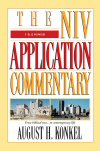
Readers of 1 and 2 Kings commonly approach these books as a straightforward chronology of post-Davidic Israel: the inauguration of Solomon’s reign, the division of the kingdom following his death, and Israel’s and Judah’s ensuing kings, conflicts, captivities, and overarching spiritual decline.
In reality, however, the books of the Kings fall into the collection known as the Former Prophets, and their true story and underlying theme center on such striking personalities as Nathan, Elijah, Elisha, and other divinely appointed spokesmen. It is God’s interaction with his people by way of his prophets and their kings—his pleadings, his warnings, and the fulfillment of his words—that comes across again and again with forcefulness and clarity. God speaks; now will his people hear, believe, and respond?
The question is as relevant for us today as it was for the ancient Israelites. Bridging the centuries, August Konkel connects past context to contemporary circumstances, helping us grasp the meaning and significance of 1 and 2 Kings and take to heart their message for us today.
A. H. Konkel is President of Providence College and Seminary in Otterburne, Manitoba. He obtained the PhD degree from Westminster Theological Seminary in 1987. He served as a translator for the book of Job in the New Living Translation, and completed a commentary on Job for the Cornerstone Biblical Commentary. He was a contributor to the New International Dictionary of Old Testament Theology and Exegesis.
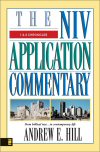
The Chronicles are more than a history of ancient Israel under the ascent and rule of the Davidic dynasty. They are a story whose grand theme is hope. Great battles are fought, heroes and tyrants vie for power, Israel splits into rival kingdoms, and the soul of God’s holy nation oscillates between faithlessness and revival. Yet above this tossing sea of human events, God’s covenant promises reign untroubled and supreme. First and Second Chronicles are a narrative steeped in the best and worst of the human heart—but they are also a revelation of Yahweh at work, forwarding his purposes in the midst of fallible people. God has a plan to which he is committed.
Today, as then, God redirects our vision from our circumstances in this turbulent world to the surety of his kingdom, and to himself as our source of confidence and peace. Exploring the links between the Bible and our own times, Andrew E. Hill shares perspectives on 1 and 2 Chronicles that reveal ageless truths for our twenty-first-century lives.
Andrew E. Hill (PhD, University of Michigan) is Professor of Old Testament Studies at Wheaton College in IL. He is the coauthor with John Walton of A Survey of the Old Testament and the author of Malachi in the Anchor Yale Bible commentary series. His articles have appeared in such scholarly publications as Hebrew Annual Review, Journal of Biblical Literature, and Vetus Testamentum.
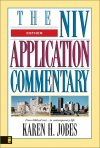
Queen Esther faced and helped avert the potential genocide of her people. She rose to the top of political power without any of the advantages of aristocratic birth, well-placed friends, inherited wealth, or social prestige.
Yet the book of Esther’s real story is not found in political intrigue or superior management ideals. It is that God is at the center of it, despite the fact that God is not mentioned anywhere in the book. The great lesson to be learned is that God keeps his promises.
This commentary shows how Esther is perfect guidance for us when we find ourselves in a situation where right and wrong are not so clearly defined and every choice we have seems to be a troubling mixture of good and bad. It is perfect inspiration for us when we find ourselves in situations we never sought, never planned for, and don’t think we have the gifts to succeed at.
Karen H. Jobes is Gerald F. Hawthorne Professor of New Testament Greek and Exegesis at Wheaton College. She is the author of many articles and several books, including Letters to the Church: A Survey of Hebrews and the General Epistles and 1 Peter in the Baker Exegetical Commentary on the New Testament.
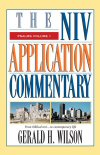
Perhaps more clearly than any other part of the biblical canon, the Psalms are human words directed to God. Yet, through the Holy Spirit, these honest, sometimes brutal words return to us as the Word of God. Their agonies and exaltations reflect more than the human condition in which they were created. Within the context of the canonical Psalter, they become the source of divine guidance, challenge, confrontation, and comfort. However, it is possible to misapply them. How can we use the Psalms in a way that faithfully connects God’s meaning in them and his intentions for them with our circumstances today?
Drawing on over twenty years of study in the book of Psalms, Dr. Gerald H. Wilson reveals the links between the Bible and our present times. While he considers each psalm in itself, Wilson goes much further, examining whole groups of psalms and, ultimately, the entire Psalter, its purpose, and its use from the days of Hebrew temple worship onward through church history. In so doing, Wilson opens our eyes to ageless truths for our twenty-first-century lives.
Gerald H. Wilson (PhD, Yale University) was Professor of Old Testament and Biblical Hebrew at Azusa Pacific University. He wrote The Editing of the Hebrew Psalter and has written numerous articles for journals, encyclopedias, and reviews.
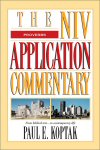
What is wisdom? Does occupying the top of life’s heap mean you have it? Does being near the bottom mean you don’t? Wisdom can certainly help you acquire wealth, influence people, or succeed at your career, yet it involves more than knowledge alone. It’s also a matter of understanding God’s perspectives in applying what you know and having the character to act accordingly. That is why true wisdom—the kind that begins with fear of the Lord—frequently runs counter to what our culture values and applauds. This is the wisdom the book of Proverbs teaches.
Proverbs deals with the relationship between heaven and earth on a practical level that covers the broad swath of human activity. We could all use more wisdom in our lives; the book of Proverbs was designed to guide us into it. Proverbs is far from monolithic. It has multiple authors and employs diverse styles. But its goal remains simple: to equip us for living in a way that succeeds first and foremost in God’s eyes. Exploring the links between the Bible and our own times, Paul Koptak shares perspectives on Proverbs that reveal ageless truths for our twenty-first-century lives.
Paul E. Koptak (PhD, Garrett Evangelical Theological Seminary/Northwestern University) is Paul and Bernice Brandel Professor of Communication and Biblical Interpretation at North Park Theological Seminary in Chicago, IL.
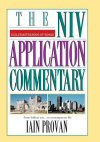
Ecclesiastes and the Song of Songs don’t easily fit our preconceptions as Christians. How do we reconcile Ecclesiastes’ seemingly hedonistic passages and its broodings on life’s futility with Christ’s call to self-denial and his revelation of God’s profound purpose for our lives? Is the Song of Songs a frank-to-the-point-of-disturbing depiction of erotic love, or is it rather a loose-fitting spiritual allegory for Christ’s relationship with the church? Must we choose between the one interpretation and the other?
Most important, what wisdom can these ancient books of the Bible offer us for living out our faith today with integrity, fervor, balance, and devotion?
Revealing the links between the Scriptures and our own times, Ian Provan shows how the wisdom books of Ecclesiastes and the Song of Songs speak to us today with relevance and conviction.
Iain Provan (PhD, Cambridge University) is Marshall Sheppard Professor of Biblical Studies at Regent College. An ordained minister of the Church of Scotland, he is the author of commentaries on Lamentations and 1 and 2 Kings.
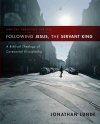
Throughout the Old Testament and into the New, God not only demands righteousness from his people but also showers on grace that enables them to act. Jesus, of course, provides the ultimate fulfillment of these twin aspects of God’s relationship to humanity. In biblical terms, Jesus is the King who demands righteous obedience from his followers, and Jesus is the Servant who provides the grace that enables this obedience.
So what does it mean to follow Jesus? What does God expect from his followers, and how can they be and do what is required? Jonathan Lunde answers these and other questions in his sweeping biblical study on discipleship. He surveys God’s interaction with his people from Eden to Jesus, paying special attention to the biblical covenants that illuminate the character and plans of God. He offers Bible students and teachers—such as pastors, missionaries, and lay leaders—the gift of practical biblical teaching rooted in the Bible’s witness on the vital topic of discipleship.
Faithfully refreshing. Lunde’s thoughtful and insightful contribution will cause many to walk with Jesus at a whole new level of faithfulness.
—J. Scott Duvall, Professor of New Testament, Ouachita Baptist University
Jonathan Lunde, in this book that is excellent for both the classroom and the church, leads us to Christ so we can see what it means to follow as disciples.
—Scot McKnight, Karl A. Olsson Professor in Religious Studies, North Park University
A breathtaking glimpse of what God has designed from the beginning of covenantal history—through a true biblical theology that plumbs the depths of Scripture—to live in an abundant New Covenant discipleship to Jesus as our Servant King.
—Michael J. Wilkins, Distinguished Professor of New Testament Language and Literature, Talbot School of Theology, Biola University
Jonathan Lunde (PhD, Trinity Evangelical Divinity School) is Associate Professor of Biblical and Theological Studies at Talbot School of Theology of Biola University. He is the coeditor (with Kenneth Berding) of Three Views on the New Testament Use of the Old Testament and has contributed articles to The Dictionary of Jesus and the Gospels and the New Dictionary of Biblical Theology.
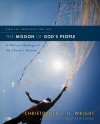
In The Mission of God’s People author Chris Wright offers a sweeping biblical survey of the holistic mission of the church, providing practical insight for today’s church leaders. Wright gives special emphasis to theological trajectories of the Old Testament that not only illuminate God’s mission but also suggest priorities for Christians engaged in God’s world-changing work.
The Mission of God reveals that the typical Christian understanding of “missions” encompasses only a small part of God’s overarching mission for the world. God is relentlessly reclaiming the entire world for himself. In The Mission of God’s People, Wright shows how God’s big-picture plan directs the purpose of God’s people, the church. Wright emphasizes what the Old Testament teaches Christians about being the people of God. He addresses questions of both ecclesiology and missiology with topics like “called to care for creation,” “called to bless the nations,” “sending and being sent,” and “rejecting false gods.” The Mission of God’s People promises to enliven and refocus the study, teaching, and ministry of those truly committed to joining God’s work in the world.
. . . extraordinarily readable, written by a preacher who knows how to communicate simply, clearly, and fascinatingly. It is refreshingly adventurous, as it explores the theme of mission in biblical passages where you might not have expected to find it. . . . remarkably practical . . . surprisingly relevant . . . outstandingly down-to-earth . . . It is thus eminently commendable . . .
—I. Howard Marshall, Professor, University of Aberdeen
What a marvelous author Chris Wright is! Here you get the distilled insight of someone who knows mission and knows the Scriptures . . . And he doesn’t confine himself to scriptural themes but enables us to get inside lots of particular Scriptures, all in easily manageable chunks. What do theology and mission have to do with each other? This book powerfully answers the question.
—John Goldingay, Professor, Fuller Theological Seminary
The Mission of God’s People is more than a biblical theology. It is a journey through the call God has given to his people to impact the world in the way God desires. . . . This book brings us there very nicely, fully using both Testaments, and even gives us questions to reflect upon in order to move us to action. Well done.
—Darrell L. Bock, Research Professor of the New Testament, Dallas Theological Seminary
This is biblical theology at its best. . . . Through his comprehensive reading of the whole Bible, he offers a robust portrayal of Israel’s mission and our own. Thank you, Chris, for showing us that God’s election is not about us; it is about the world. May this work inspire his church to greater faithfulness in giving verbal witness to God’s redemptive grace for the cosmos, but also to greater ethical faithfulness as we embody his grace in the microcosms in which we live.
—Daniel Block, Professor, Wheaton College
. . . Christopher Wright shows in The Mission of God’s People that grounding missions practice in the prior action and plan of God does not render the church static or passive. In this masterful survey, Wright demonstrates decisively what happens when the whole church starts reading the whole Bible and reflecting the full scope of God’s good news in all our life and witness in the world. This is the long-awaited road map that moves missions from the practice of a few elite professionals to the faithful witness of all of God’s children. If want to help your church become a missional church, I cannot think of a better place to begin that journey than this book. I assure you, you will discover afresh who you are in Christ and what you are here for!
—Timothy Tennent, Professor, Asbury Theological Seminary
A wonderfully kaleidoscopic biblical overview of the privileged role afforded to all of God’s people in fulfilling the Missio Dei in the world. Chris Wright demonstrates that the theme of the mission of God and his people is a prominent and unmistakable thread running through the elaborate tapestry of the whole of Scripture. In so doing, he provides a ringing affirmation that it is the responsibility of the whole church to bear witness to Christ and his kingdom in every area of the world geographically, as well as in every sphere of society.
—Lindsay Brown, Director, Lausanne Movement for World Evangelization
Christopher J. H. Wright is International Director of the Langham Partnership International. He also serves as Chair of the Lausanne Movement’s Theology Working Group and Chair of the Theological Resource Panel of TEAR Fund, a leading Christian relief and development charity. He has written several books, including Living as the People of God, God’s People in God’s Land, Knowing Jesus through the Old Testament, Walking in the Ways of the Lord, Deuteronomy in the New International Biblical Commentary, The Message of Ezekiel in the Bible Speaks Today series, Old Testament Ethics for the People of God, The Mission of God, and The God I Don’t Understand.
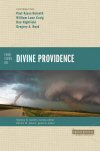
Questions about divine providence have preoccupied Christians for generations. Are people elected to salvation? For whom did Jesus die? This book introduces readers to four prevailing views on divine providence, with particular attention to the question of who Jesus died to save (the extent of the atonement) and if or how God determines who will be saved (predestination). But this book does not merely answer readers’ questions.
Four Views on Divine Providence helps readers think theologically about all the issues involved in exploring this doctrine. The point-counterpoint format reveals the assumptions and considerations that drive equally learned and sincere theologians to sharp disagreement. It unearths the genuinely decisive issues beneath an often superficial debate. Volume contributors are:
- Paul Helseth: God Causes All Things
- William Lane Craig: God Directs All Things
- Ron Highfield: God Controls by Liberating
- Gregory Boyd: God Limits His Control
Each author explains his position, which is critiqued by the other three authors. The interactive and fair-minded nature of the counterpoints format allows the reader to consider the strengths and weaknesses of each view and draw informed, personal conclusions. Introductory and closing essays by Dennis Jowers give relevant background and guide readers toward their own informed beliefs about divine providence.
Paul Kjoss Helseth (PhD, Marquette University) is Professor of Christian Thought at Northwestern College in St. Paul, MN. He is the author of “Right Reason” and the Princeton Mind: An Unorthodox Proposal, and has co-edited and contributed to Beyond the Bounds and Reclaiming the Center.
William Lane Craig (PhD, University of Birmingham, England) is Research Professor of Philosophy at Talbot School of Theology, Biola University and lives in Marietta, GA.
Ron Highfield (BA, MTh, Harding University; MA, PhD, Rice University), Professor of Religion at Pepperdine University, is the author of Great is the Lord: Theology for the Praise of God
Gregory A. Boyd is the founder and senior pastor of Woodland Hills Church in St. Paul, MN, and is Founder and President of Christus Victor Ministries. He was Professor of Theology at Bethel College in Minnesota for sixteen years. He is a national and international speaker at churches, colleges, conferences, and retreats, and has appeared on numerous radio and television shows.
Dennis Jowers is Associate Professor of Theology and Apologetics at Faith Evangelical Seminary in Tacoma, Washington.
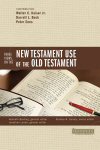
To read the New Testament is to meet the Old Testament at every turn. But exactly how do Old Testament texts relate to their New Testament references and allusions? Moreover, what fruitful interpretive methods do New Testament texts demonstrate? Leading biblical scholars Walter Kaiser, Darrel Bock, and Peter Enns each present their answers to questions surrounding the use of the Old Testament in the New Testament.
This volume introduces three approaches presently employed in the study of the uses of the Old Testament in the New Testament, especially in those instances where the New Testament authors discern the fulfillment of a prophetic element in the Old Testament text. The foundational issue concerns the relationship between an Old Testament author’s meaning and the meaning of that same passage when it is used by a New Testament author. Contributors address elements such as divine and human authorial intent, the context of Old Testament references, and theological grounds for an interpretive method. Each author applies his framework to specific texts so that readers can see how their methods work out in practice. Each contributor also receives a thorough critique from the other two authors. A one-stop reference for setting the scene and presenting approaches to the topic that respect the biblical text, Three Views on the New Testament Use of Old Testament gives readers the tools they need to develop their own views on this important subject.
Walter C. Kaiser Jr. (PhD, Brandeis University) is Distinguished Professor Emeritus of Old Testament and President Emeritus of Gordon-Conwell Theological Seminary in South Hamilton, Massachusetts. Dr. Kaiser has written over forty books, including Toward an Exegetical Theology: Biblical Exegesis for Preaching and Teaching, The Messiah in the Old Testament, and The Promise-Plan of God, and coauthored An Introduction to Biblical Hermeneutics: The Search for Meaning.
Darrell L. Bock (PhD, University of Aberdeen) is Professor of New Testament at Dallas Theological Seminary.
Peter Enns is a Reformed Evangelical Christian and a biblical scholar. He is a frequent contributor to journals and encyclopedias, and the author of several books, including Exodus in the NIV Application Commentary and Inspiration and Incarnation: Evangelicals and the Problem of the Old Testament.
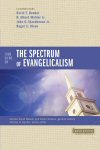
Four Views on the Spectrum of Evangelicalism compares and contrasts four distinct positions on the current fundamentalist-evangelical spectrum in light of the history of American fundamentalism and evangelicalism.
The contributors each state their case for one of four views on the spectrum of evangelicalism:
- Kevin T. Bauder: Fundamentalism
- R. Albert Mohler Jr.: Conservative/confessional evangelicalism
- John G. Stackhouse Jr.: Generic evangelicalism
- Roger E. Olson: Postconservative evangelicalism
Each contributor defines evangelicalism, locates his view in historical context, and discusses how he understands Scripture and its authority. To illustrate the differences, each addresses the three issues recently contested within evangelicalism:
- The question of Christian cooperation illustrated by Evangelicals and Catholics Together and the Manhattan Declaration
- The question of doctrinal boundaries raised by open theism, a debate that has shaken denominations, schools, and the Evangelical Theological Society in the 1990s and 2000s
- Penal substitutionary atonement—a key doctrinal issue related to the gospel
Each author explains his position, which is critiqued by the other three authors. The interactive and fair-minded nature of this format allows the reader to consider the strengths and weaknesses of each view and draw informed, personal conclusions.
Collin Hansen (MDiv, Trinity Evangelical Divinity School) is Editorial Director for the Gospel Coalition. Formerly an associate editor for Christianity Today, he is the author of Young, Restless, Reformed and coauthor with John Woodbridge of A God-Sized Vision. He has written for Books & Culture, Tabletalk, Leadership, and Christian History & Biography. He has appeared as a commentator on Fox News, and his work has been featured in Time magazine.
Andrew David Naselli (PhD, Bob Jones University; PhD, Trinity Evangelical Divinity School) is Research Manager for D. A. Carson and Administrator of the journal Themelios. He has taught New Testament Greek at the undergraduate and graduate levels, and he currently teaches exegesis and theology as adjunct faculty at several seminaries. He is the author of Let Go and Let God? A Survey and Analysis of Keswick Theology.
Kevin Bauder (DMin, Trinity Evangelical Divinity School; PhD, Dallas Theological Seminary) is past President of and current Research Professor of Systematic and Historical Theology at Central Baptist Theological Seminary, Minneapolis. He is a general editor of One Bible Only? Examining Exclusive Claims for the King James Bible.
R. Albert Mohler Jr. (PhD, Southern Baptist Theological Seminary), is President and Joseph Emerson Brown Professor of Christian Theology at The Southern Baptist Theological Seminary. He is the author of several books, including Words from the Fire: Hearing the Voice of God in the 10 Commandments, and is a contributor to Is Hell for Real: Or Does Everyone Go to Heaven?
John G. Stackhouse Jr. (PhD, University of Chicago) is Sangwoo Youtong Chee Professor of Theology and Culture at Regent College. He is the author or editor of eleven books, including Making the Best of It: Following Christ in the Real World. He is a former president of the Canadian Evangelical Theological Association.
Roger E. Olson (PhD, Rice University) is Professor of Theology at George W. Truett Theological Seminary of Baylor University. He is the author of many books, including Questions to All Your Answers: The Journey from Folk Religion to Examined Faith, Reformed and Always Reforming: The Postconservative Approach to Evangelical Theology, and How to Be Evangelical without Being Conservative.
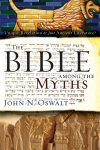
Sixty years ago, most biblical scholars maintained that Israel’s religion was unique—that it stood in marked contrast to the faiths of its ancient Near Eastern neighbors. Nowadays, it is widely argued that Israel’s religion mirrors that of other West Semitic societies. What accounts for this radical change, and what are its implications for our understanding of the Old Testament?
Dr. John N. Oswalt says the root of this new attitude lies in Western society’s hostility to the idea of revelation, which presupposes a reality that transcends the world of the senses, asserting the existence of a realm humans cannot control.
While not advocating a “the Bible says it, and I believe it, and that settles it” point-of-view, Oswalt asserts convincingly that while other ancient literatures all see reality in essentially the same terms, the Bible differs radically on all the main points. The Bible Among the Myths supplies a necessary corrective to those who reject the Old Testament’s testimony about a transcendent God who breaks into time and space and reveals himself in and through human activity.
For more than a century people have been debating the relationship between myth and history and how the biblical narratives fit into this debate. In offering readers an accessible introduction to this discussion, John Oswalt highlights the distinctiveness of the biblical worldview. . . . This book will be extremely helpful for both undergraduate and graduate students, offering a carefully seasoned response to the critical scholarship of our time.
—Daniel I. Block, Gunther H. Knoedler Professor of Old Testament, Wheaton College
John N. Oswalt (PhD, Brandeis University) is Visiting Distinguished Professor of Old Testament at Asbury Theological Seminary in Wilmore, Kentucky. He is the author of numerous articles and several books, including the two-volume commentary on Isaiah in the New International Commentary on the Old Testament series and Called to be Holy: A Biblical Perspective.
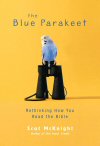
Parakeets make delightful pets. We cage them or clip their wings to keep them where we want them. Scot McKnight contends that many, conservatives and liberals alike, attempt the same thing with the Bible. We all try to tame it.
McKnight’s The Blue Parakeet has emerged at the perfect time to cool the flames of a world on fire with contention and controversy. It calls Christians to a way to read the Bible that leads beyond old debates and denominational battles. It calls Christians to stop taming the Bible and to let it speak anew for a new generation.
In The Blue Parakeet, McKnight touches the hearts and minds of today’s Christians, challenging them to rethink how to read the Bible, not just to puzzle it together into some systematic theology but to see it as a Story that we’re summoned to enter and to carry forward in our day. He calls his bold new approach to the Bible the “Third Way,” a path that walks confidently—and joyfully—between theological extremes. The Third Way is rooted in the Bible as Story, in the Bible as God’s Word to which we listen, in the Bible as revealing a life that we can apply anew in our day.
In his own inimitable style, McKnight sets traditional and liberal Christianity on its ear, leaving readers equipped, encouraged, and emboldened to be the people of faith they long to be. The Blue Parakeet is an engaging, warm narrative that is both deeply reasoned and spiritually sound. It is a book that will appeal to disenfranchised Christians who will be drawn to it because of its refreshing—and liberating—new approach to reading the Bible.
Blue Parakeet is the book Scot McKnight was born to write. If you are interested in the Bible, or God, or your mind, or where these three might intersect, you will be blessed if you read this book.
—John Ortberg, Senior Pastor, Menlo Park Presbyterian Church
This is far and away the best, gentlest, most intelligent argument I have ever read for the absolute necessity of embracing the Bible as story. McKnight is in full and persuasive command of both his material and his craft.
—Publisher’s Weekly
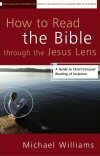
Many Christians today experience Bible teaching in isolated, unconnected pieces, receiving little or no guidance into how these pieces form a coherent picture in Christ. How to Read the Bible through the Jesus Lens connects each of the sixty-six books of the Bible to the person and work of Jesus Christ. By explaining each book’s theme and raising pertinent questions about the contemporary importance of that message, author Michael Williams sets readers on a path toward purposeful, independent reading, and application of the entire Bible. How to Read the Bible through the Jesus Lens presents Christ as the central focus of each biblical book and the primary way the Bible relates to contemporary circumstances. Each book of the Bible has an identifiable theme ultimately fulfilled in the person and work of Christ. Williams provides the following for his readers:
- Succinct statement of the theme of every biblical book
- An explanation of how that theme finds its focus in Christ
- A brief discussion of how the New Testament treats that theme as fulfilled in Christ
- Suggestions for contemporary implications
- A convenient summary chart
An excellent tool for Bible teachers, ministry leaders, and students, How to Read the Bible through the Jesus Lens facilitates other Christian disciplines such as Bible reading, Scripture memory, and evangelism. By demonstrating how each theme relates to living the Christian life, this book promises to be an invaluable guide for reading and understanding the Bible.
Few books do a better job of giving us an overview of Genesis to Revelation in such a compact way. This is the sort of book I’d love to have in the hands of every member of my church!
—Justin Taylor, Managing Editor, ESV Study Bible
[Offers] suggestive and stimulating ways for us to see Christ as the climax of the story; let Williams begin to shape the way you read the whole Bible.
—Kelly M. Kapic, Professor of Theological Studies, Covenant College
Michael Williams has written a book that is badly needed: a survey of all the books of the Bible that shows how they work together to point toward Jesus Christ . . . accessible to almost any reader.
—Douglas J. Moo, Wessner Chair of Biblical Studies, Wheaton College
Michael Williams (PhD, University of Pennsylvania) is Professor of Old Testament at Calvin Theological Seminary and a member of the NIV Committee on Bible Translation. He is the author of Deception in Genesis and The Prophet and His Message, and editor and contributor of Mishneh Todah. His passion is to equip students with knowledge of the Old Testament and its languages so that they may grow in their comprehension and appreciation of redemptive history and be adequately prepared to promote and defend the faith through word and action.
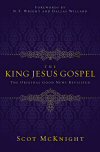
Contemporary Christians have built a “salvation culture” but not a “gospel culture.” Evangelicals have reduced the gospel to the message of personal salvation. This book makes a plea for us to recover the old gospel as that which is still new and still fresh.
This book succinctly and without pretense demonstrates that the gospel is defined by the apostles in 1 Corinthians 15 as the completion of the story of Israel in the saving story of Jesus. McKnight shows us that the gospel was preached by Jesus, and that the sermons in the Book of Acts are the best example of gospeling in the New Testament. The King Jesus Gospel ends with practical suggestions about evangelism and about building a gospel culture.
The revolution Scot is proposing is massive . . . [and] we all urgently need to allow this deeply biblical vision of ‘the gospel’ to challenge the less-than-completely-biblical visions we have cherished for too long, around which we have built a good deal of church life and practice. This book could be one of God’s ways of reminding the new generation of Christians that it has to grow up, to take responsibility for thinking things through afresh, to look back to the large world of the full first-century gospel in order then to look out on the equally large world of twenty-first century gospel opportunity.
—N. T. Wright, from the Foreword
Scot McKnight here presents, with great force and clarity, the one gospel of the Bible and of Jesus the King and Savior . . . Study the Gospels to see how Jesus did it, and then do it in the matter he did it. You don’t need a program, a budget, or any special qualifications to do this. Just understand it in the biblical form and do it. Scot McKnight gives you the key.
—Dallas Willard, from the Foreword
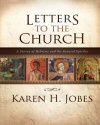
Respected New Testament scholar Karen Jobes explores the cultural and theological background of Hebrews and the General Epistles (James through Jude) in this rich commentary. Writing from an evangelical perspective, Jobes addresses issues of historical relevance as well as how these ancient books connect with Christian faith and practice today.
Letters to the Church includes:
- Historical background for each book focusing on authorship, genre, date, and content
- An exploration of the major themes in each book and detailed commentary on key passages
- Boxes with chapter goals, outlines, challenges, and significant verses
- Maps, photographs, charts, and definitions
- Questions for discussion, reflection, and testing
- A comparison of the teachings about Christ in each of the letters
Pastors, professors, students, and laypeople interested in deeper biblical study will find this an invaluable resource that offers well-researched commentary in an accessible, spiritually meaningful form.
Karen Jobes’ survey is clearly written, critically informed, beautifully illustrated, background-enlightening, and theologically rich. This volume wil make an ideal textbook for the study of the letters that it covers.
—Robert H. Gundry, Scholar-in-Residence, Westmont College
Professor Jobes combines lively prose and scholarly depth to make the most neglected books in the New Testament come alive for students. This is, without rival, the most engaging introduction available to these important but difficult biblical books.
—Frank Thielman, Presbyterian Professor of Divinity, Beeson Divinity School of Samford University
This clear, accessible, thorough, and well-organized study of Hebrews and the General Epistles is an ideal text for survey courses. Jobes utilizes the best of biblical scholarship but presents it in a manner that beginning students will understand.
—Mark L. Strauss, Professor of New Testament, Bethel Seminary
Jobes insightfully addresses the historical, literary, and theological features of these letters and does so with a conversational and engaging demeanor. Letters to the Church is a comprehensive introduction to these letters and a great textbook choice for college and seminary classrooms.
—Jeanine Brown, Professor, Bethel Seminary
This is the textbook on the General Epistles I have been waiting for. It is thorough and accessible, even for students with little biblical background knowledge.
—Dan McCartney, Professor of New Testament, Westminster Theological Seminary
Karen H. Jobes is Gerald F. Hawthorne Professor of New Testament Greek and Exegesis at Wheaton College. She is the author of many articles and several books, including Esther in The NIV Application Commentary.
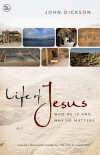
What really happened back in the first century, in Jerusalem and around the Sea of Galilee, that changed the shape of world history? Who is this figure that emerges from history to have a profound impact on culture, ethics, politics, and philosophy? Join historian John Dickson on this journey through the life of Jesus. This book will help you and your friends dig deeper into what is known about Jesus’ life and why it matters.
John Dickson is an engaging and gifted scholar whom I am privileged to work alongside in various global settings. His passion for history, keen knowledge of the Scriptures, and ability to communicate are truly inspiring. I am thrilled to see his unique work displayed in Life of Jesus and I know you will find this study equally fascinating.
—Ravi Zacharias, Founder and Chairman of the Board, Ravi Zacharias International Ministries
John Dickson has done a marvelous job of presenting the story of Jesus, and the full meaning of that story, in a way that is both deeply faithful to the biblical sources and refreshingly relevant to tomorrow’s world and church. I strongly recommend this study to anyone who wants to re-examine the deep historical roots of Christian faith and to find them as life-giving as they ever were.
—N. T. Wright, Professor Emeritus of New Testament and Early Christianity, St. Andrews University
John Dickson (PhD, Macquarie University, Sydney) is Senior Research Fellow of the Department of Ancient History, Macquarie University, Co-director of the Centre for Public Christianity, and Senior Minister at St. Andrew’s Roseville. The author of more than a dozen books, he is the host of two major historical documentaries for Australian television and is a busy public speaker in corporations, universities, churches, and conferences.
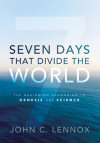
What did the writer of Genesis mean by “the first day”? Is it a literal week or a series of time periods? If I believe that the earth is 4.5 billion years old, am I denying the authority of Scripture?
In response to the continuing controversy over the interpretation of the creation narrative in Genesis, John Lennox proposes a succinct method of reading and interpreting the first chapters of Genesis without discounting either science or Scripture. With examples from history, a brief but thorough exploration of the major interpretations, and a look into the particular significance of the creation of human beings, Lennox suggests that Christians can heed modern scientific knowledge while staying faithful to the biblical narrative.
He moves beyond a simple response to the controversy, insisting that Genesis teaches us far more about the God of Jesus Christ and about God’s intention for creation than it does about the age of the earth. With this book, Lennox offers a careful yet accessible introduction to a scientifically-savvy, theologically-astute, and scripturally-faithful interpretation of Genesis.
This book is a delight to read: it is thoughtful, perceptive, friendly, and bold when it needs to be.
—C. John Collins, Professor of Old Testament, Covenant Theological Seminary
Accessible, wide-ranging, balanced, and irenic. A wise, well-informed work, and it deserves the widest readership possible.
—Paul Copan, Professor and Pledger Family Chair of Philosophy and Ethics, Palm Beach Atlantic University
Addresses a passionate controversy with charity, humor, and humility. I enthusiastically endorse this unique and insightful book.
—Ravi Zacharias, Founder and Chairman of the Board, Ravi Zacharias International Ministries
Careful and well-documented study. Every careful reader will come away more knowledgeable, wiser, and better able to defend the truth of the Bible before a skeptical world.
—Doug Groothuis, Professor of Philosophy, Denver Seminary
What a fine book! This book is as good as it gets in the religion/science area.
—Alvin Plantinga, John A. O’Brien Professor Emeritus of Philosophy, University of Notre Dame
Worthy of a careful reading by those interested in the ongoing science/religion discussion.
—Henry F. Schaefer III, Graham Perdue Professor of Chemistry, University of Georgia
John C. Lennox (PhD, DPhil, DSc) is Professor of Mathematics in the University of Oxford, Fellow in Mathematics and the Philosophy of Science, and Pastoral Advisor at Green Templeton College, Oxford. He is author of God’s Undertaker: Has Science Buried God? on the interface between science, philosophy, and theology. He lectures extensively in North America and in Eastern and Western Europe on mathematics, the philosophy of science, and the intellectual defense of Christianity, and he has publicly debated New Atheists Richard Dawkins and Christopher Hitchens.
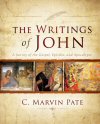
The writings of John are some of the most foundational New Testament documents for today’s Christians. Most evangelical teaching about the life of Jesus begins with the Gospel of John, and Christian teaching on the end times relies heavily on the book of Revelation. Students, pastors, and lay learners need solid, up-to-date resources like this book to responsibly study and understand John’s writings.
C. Marvin Pate addresses John’s writings according to their logical divisions: the Gospel of John, the Johannine Epistles, and Revelation. Each section includes a thorough introduction to relevant interpretive issues, including historical background, cultural setting, and theological context. Pate presents a two-fold historical setting for John’s gospel, encouraging readers to consider the text from the perspective of Jesus’ day and from John’s situation in Asia Minor sixty years later. He examines the Johannine epistles on issues like authorship, audience, and theological perspective. For the Apocalypse, Pate explores the challenges of John’s first readers, the nature of apocalyptic literature, and the Roman imperial cult, including as well an explanation of how the church has interpreted Revelation over the years. With its thorough discussion, textbook design, and four-color interior, The Writings of John sets the standard for introductory texts on biblical books or collections.
This book skillfully summarizes the substance of the New Testament writings traditionally associated with the Apostle John. Students will appreciate the creative, visually rich layout with attention-grabbing sidebars. Teachers will applaud the airing of scholarly theories and convictions. Few books contain a more thorough presentation of these five writings in their historical, literary, and theological dimensions. The Writings of John will be a prized resource in the college and seminary classroom for years to come.
—Robert W. Yarbrough, Professor of New Testament, Covenant Theological Seminary
If you are looking for a reliable textbook on the writings of John that will engage students, look no further. Pate’s informed survey features a rich awareness of historical background, consistent exegetical depth, and insightful theological commentary. In addition to Pate’s expert guidance, the book features an attractive presentation, along with helpful teaching aids. It’s rare to find a superb treatment of all of John’s writings in a single resource. For the sake of our students, I highly recommend it.
—J. Scott Duvall, Professor of New Testament, Ouachita Baptist University
C. Marvin Pate (MA, Wheaton; PhD, Marquette University) taught for thirteen years at Moody Bible Institute. Now he is Chair of the Department of Christian Theology and Professor of Theology at Ouachita Baptist University. Pate has authored, coauthored, or edited twenty books.
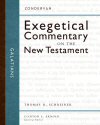
In his commentary on Galatians, Thomas R. Schreiner presents a brief and lucid commentary for pastors, students, and laypeople, while also attending to questions that have arisen in light of the New Perspective on Paul. Schreiner, endorsing a Reformation reading of the text, reminds readers of Paul’s chief concerns in writing the letter: justification by faith, the full divinity of Christ, freedom from the power of sin through the death and resurrection of Christ Jesus, and dependence on the Holy Spirit to live the Christian life. Schreiner argues that it is not enough to read Galatians with an academic lens; we must realize that these are issues of life and death, and we must let the gospel revive us.
Thomas R. Schreiner (PhD, Fuller Theological Seminary) is James Buchanan Harrison Professor of New Testament and Associate Dean of Scripture and Interpretation at The Southern Baptist Theological Seminary in Louisville, Kentucky. The author of numerous books, he is the preaching pastor of Clifton Baptist Church in Louisville, Kentucky.
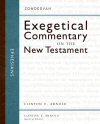
In this volume, Clinton Arnold highlights four themes that emerge in Paul’s epistle to the Ephesians:
- The superior power of God over against spiritual powers
- The unity of Jews and Gentiles through Jesus Christ
- The encouragement for Gentiles believers to live holy lives before God
- The need for believers to be rooted in the knowledge of their new identity in Christ Jesus
Woven into Paul’s theology is a refrain of praise and adoration to the glory of God that insists that such praise should also be our response. With attention to issues that continue to surface in today’s church, this commentary offers pastors, students, and teachers a focused resource for reading Ephesians.
Clinton E. Arnold (PhD, University of Aberdeen) is professor of New Testament language and literature at Talbot School of Theology in La Mirada, California.
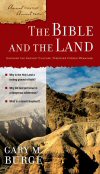
As the early church moved away from the original cultural setting of the Bible and found its home in the west, Christians lost touch with the ancient world of the Bible. Cultural habits, the particulars of landscape, even the biblical languages soon were unknown. And the cost was enormous: Christians began reading the Bible as foreigners and missing the original images and ideas that shaped a biblical worldview. Here Gary M. Burge explores primary motifs from the biblical landscape—geography, water, rock, bread, etc.—and applies them to vital stories from the Bible. The Bible and the Land explores a series of primary cultural motifs that contributed to the ancient biblical worldview.
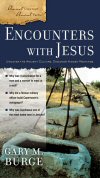
One of the more surprising features of Jesus’ ministry was his willingness to have personal encounters with people. And one of the most unique features of the Gospels is the unexpected stories that detail Jesus’ regular interruptions. These “interruptions” came in the form of people from all walks of life—young, old, rich, poor, sick, healthy, riddled with sin, or saddled by self-righteousness.
Encounters with Jesus explores the interactions between Jesus and the everyday people of the ancient biblical world. Whether they were part of the chosen twelve, or were outsiders desperate for Jesus’ healing touch, Gary Burge revisits Jesus’ daily interruptions in antiquity, reaching a startling conclusion that applies to you today: all are welcome.
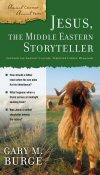
Communication in Jesus’ world involved the use of word pictures, dramatic actions, metaphors, and stories. Rather than lecture about religious corruption, Jesus refers to the Pharisees as “whitewashed tombs.” Rather than outline the failings of the Temple, he cures a fig tree. Without a perceptive and careful use of the culture of the ancient world, we read the stories of Jesus as foreigners.
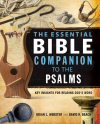
The Essential Bible Companion to the Psalms provides fundamental information regarding the meaning, background, context, and application of the Psalms. In addition to practical application, numerous charts are included that provide information about the various types of psalms (messianic, prophetic, etc.) along with a quick reference list of psalms that lend themselves to being used for worship or personal meditation or as a basis for praying the Scriptures.
Through the use of full-color visual images, the message and world of the Psalms are brought to life in a way never before presented, making this book not only an excellent resource for understanding the Psalms. The Essential Bible Companion to the Psalms is a must-have for students of the Bible, pastors, and anyone who desires to possess a unique reference guide to these ancient works of poetry and worship.
Brian L. Webster (PhD) is Associate Professor of Old Testament Studies at Dallas Theological Seminary. He did his doctoral work at the Hebrew Union College-Jewish Institute of Religion. He is a homeschooling father of four and a Youth Leader at his church.
David R. Beach (MA) is a licensed counselor who studied under Dr. Dan Allender at Mars Hill Graduate School. He teaches spiritual formation and psychology courses at Cornerstone University. He also cofounded Soul Seasons with his wife Cynthia—a workshop based ministry focused on spiritual and creative formation.
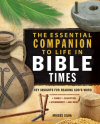
The Essential Companion to Life in Bible Times organizes material in thematic fashion and distills from the various articles the information that is most useful for appreciating the cultural background of the biblical writings. The book begins with a chapter on the family, describing what the Bible says about children, from their birth through their education, and discusses the roles played by men and women when they reached adulthood. The topics of sex, marriage, divorce, old age, death, and burial are also treated. From there, topics include:
- The household: from house architecture and furniture to the subjects of food and water, as well as health and illness in biblical times
- Social life: including population, the calendar, economics, crafts, travel and trade, dress, and music
- Government: in the towns, the larger cities, and the state; including the role of the king, as well as the function of elders and officials
- Israel’s religious life: from the use of high places and altars, to the importance of the tabernacle and the temple, to the role of priests and Levites
Drawing on a wealth of material from the Zondervan Encyclopedia of the Bible and the Zondervan Illustrated Bible Dictionary, this book is most useful for uncovering, understanding, and appreciating the cultural background of the biblical writings.
Moisés Silva taught biblical studies at Westmont College, Westminster Theological Seminary, and Gordon-Conwell Seminary. He is the author or coauthor of eight books and the revising editor of the Zondervan Encyclopedia of the Bible.
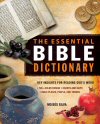
If you are looking for a Bible study tool that is compact, easy to understand, and does not require a Bible degree to use, then The Essential Bible Dictionary is for you. In addition to defining words, places, people, and the many themes of the Bible, this concise reference work is:
- Visually stimulating, with full-color images and illustrations
- Ideal for use in devotions or personal Bible study
- A storehouse of information, providing essential information regarding the world of the Bible
- Organized A–Z
- Filled with charts and maps that bring the everyday world of the Bible to life
The Essential Bible Dictionary is for all ages and provides insights into the world of the Bible for years to come. For use with any translation of the Bible, and presented in full-color, this is the most up-to-date, trusted resource for devotions, personal Bible study, and teaching.
Moisés Silva taught biblical studies at Westmont College, Westminster Theological Seminary, and Gordon-Conwell Seminary. He is the author or coauthor of eight books and the revising editor of the Zondervan Encyclopedia of the Bible.
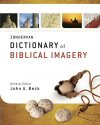
Biblical authors seized imagery drawn from everyday life and redeployed it in the service of divine revelation. But today’s readers are not familiar with many of these once-common illustrations. The distance in time, place, and culture between the Bible’s first recipients and people today often mutes the rhetorical impact of such images.
Students of the Bible need someone to explain both the meaning and significance of the imagery found in the biblical text. The Zondervan Dictionary of Biblical Imagery provides the kind of assistance today’s readers need. Entries explain images that correspond to a cultural artifact from the biblical world (such as arrow or sandal), a component of natural history (such as fox or fig tree), a named place (such as Mount Sinai or Nazareth), or a component of the Promised Land’s physical geography (such as mountain or wilderness) Each entry contains a description of the element or image, examples of how the image is used in the biblical text, and appropriate photographs and maps that further illustrate the ideas presented. Students of Scripture will find the Zondervan Dictionary of Biblical Imagery a fascinating and inspiring portal to the biblical world.
John Beck earned his ThM and PhD from Trinity International University and is currently an adjunct instructor for Jerusalem University College. His passion to aid others in their Bible reading has led to the publication of a variety of books, including The Land of Milk and Honey, God as Storyteller, and A Visual Guide to Bible Events.
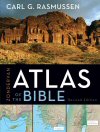
This major revision of the Gold Medallion Award-winning Zondervan NIV Atlas of the Bible is a visual feast that will help you experience the geography and history of Scripture with unprecedented clarity. The first section of the Atlas introduces the “playing board” of biblical history—using three–dimensional maps and photographic images to help the lands of the Bible come alive. The next section, arranged historically, begins with Eden and traces the historical progression of the Old and New Testaments. It provides an engaging, accurate, and faithful companion to God’s Word—illuminating the text with over one hundred full-color, multidimensional maps created with the help of Digital Elevation Modeling data. It concludes with chapters on the history of Jerusalem, the disciplines of historical geography, and the most complete and accurate listing and discussion of place-names found in any atlas.
Throughout the Atlas, innovative graphics, chronological charts, and over one hundred specially selected images help illuminate the geographical and historical context of biblical events. The Zondervan Atlas of the Bible is destined to become a favorite guide to biblical geography for students of the Bible. This accessible and complete resource will assist you as you enter into the world of the Bible as never before.
Carl Rasmussen (PhD, Dropsie University) was Professor of Old Testament at Bethel University in St. Paul, Minnesota, and Adjunct Professor at the Institute of Holy Land Studies in Jerusalem. He is the author and creator of the Zondervan NIV Atlas of the Bible.
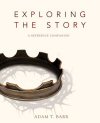
Exploring the Story helps you understand and grasp the significance of each chapter in the The Story, an innovative Bible that presents Scripture as a continuous narrative in chronological order. The big picture of God’s redemptive plan comes into focus as you learn about the following elements:
- Timeline: shows how the events of The Story relate to the rest of history
- Plot Points: briefly describes the key narrative themes of a passage
- Cast of Characters: introduces the people featured in the text
- Chapter Overview: summarizes the corresponding chapter in The Story
- Discussion Questions: gives ideas for individual or group reflection
- Section Commentary: presents theological issues, important archaeological discoveries, or launch points for further discussion
Small group leaders, pastors, and lay students of the Bible will gain a deeper understanding of God’s life-changing redemptive plan by reading this book alongside The Story.
Adam T. Barr is Pastor of Teaching Ministries at Corinth Reformed Church and President of Borderlands, a ministry that equips church and campus ministries to disciple Next Generation leaders. He has earned degrees from Hope College, Western Theological Seminary, and Trinity Evangelical Divinity School, and studied at Westminster Theological Seminary. He updated, edited, and contributed to the Zondervan Illustrated Commentary: One-Volume Illustrated Edition.
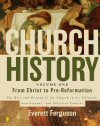
Church History offers a unique contextual view of how the Christian church spread and developed. It did so not in a vacuum, but in a setting of times, cultures, and events that both influenced and were influenced by the church. Church History looks closely at the integral link between the history of the world and that of the church. Volume one explores the development of the church from the days of Jesus to the years prior to the Reformation.
Filled with maps, charts, and illustrations, it offers overviews of the Roman, Greek, and Jewish worlds; insights into the church’s relationship to the Roman Empire, with glimpses into pagan attitudes toward Christians; the place of art and architecture, literature, and philosophy, both sacred and secular; and much more, spanning the time from the first through the thirteenth centuries.
Everett Ferguson (PhD, Harvard) is Professor Emeritus of Bible and Distinguished Scholar-in-Residence at Abilene Christian University in Abilene, Texas, where he taught church history and Greek. He is the author of numerous works, including Backgrounds of Early Christianity, Early Christians Speak, and Inheriting Wisdom: Readings for Today from Ancient Christian Writers. He was also general editor of the two-volume Encyclopedia of Early Christianity.

This is history at its best. From Jerusalem to Irian Jaya is readable, informative, gripping, and above all, honest. It helps readers understand the life and role of a missionary through real life examples of missionaries throughout history. We see these men and women as fallible and human in their failures as well as their successes. These great leaders of missions are presented as real people, and not super-saints.
This second edition covers all 2,000 years of mission history with a special emphasis on the modern era, including chapters focused on the Muslim world, Third World missions, and a comparison of missions in Korea and Japan. It also contains both a general and an “illustration” index where readers can easily locate particular missionaries, stories, or incidents. New design graphics, photographs, and maps help make this a compelling volume. From Jerusalem to Irian Jaya is as informative and intriguing as it is inspiring—an invaluable resource for missionaries, mission agencies, students, and all who are concerned about the spreading of the gospel throughout the world.
This book, now better than ever, has no competition. No one has ever so ably, efficiently, and delightfully linked together the key personalities that portray so dynamically the story of the expansion of our faith from a handful of people in Jerusalem to the very ends of the earth. It is a must-read for all serious believers.
—Ralph D. Winter, Founder, William Carey International University
Ruth A. Tucker (PhD, Northern Illinois University) has taught mission studies and church history at Trinity Evangelical Divinity School and Calvin Theological Seminary. She is the author of dozens of articles and eighteen books.
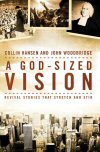
Is it possible we don’t see God working in mighty ways because we don’t ask him to work in mighty ways? Throughout history, God has used revival to build and renew his church. God-Sized Vision challenges us to pray expectantly to see his work in our own day. God can bring revival again to our community, our country, and our world.
Our faith grows stronger when we learn how God worked in the past. The historical stories of worldwide revivals in this book enlarge our hearts and expand our minds as we see God at work in human history with a power that is still available to the faithful today. Here scholars Collin Hansen and John Woodbridge recount the fascinating details of world-changing revivals, beginning with biblical events and continuing through the Reformation, the Great Awakenings, the Welsh and Korean revivals, the East Africa Revival of the 1930s, and more recent revivals in North America and China.
What did these revivals have in common? How can we prepare for—and expect—revival in our own culture? With accessible language and gripping examples, Hansen and Woodbridge explore these questions and more, strengthening our understanding of God’s work while deepening our faith in the possibility of revival—right where we are.
The importance of spiritual revival and the necessity of conversion is being questioned in many evangelical and Reformed circles. I’m so glad that this book is appearing now, as a witness both to how God has worked in the church in the past and what he can do in the future.
—Tim Keller, Pastor, Redeemer Presbyterian Church
We live in immensely serious times, and this book is a serious response that could truly inspire the church to do what it must do in our world today. May God use this to light a fire among his people.
—Chuck Colson, Founder, Prison Fellowship and the Colson Center for Christian Worldview
This book shows how God has moved in extraordinary ways throughout the history of the church. Genuine revival is not the result of marketing, technique, or entrepreneurship. As the stories here show, true revival comes as a “surprising work of God.” When this happens, lives are changed, the church reformed, and the world renewed. How we need such a stirring today!
—Timothy George, Dean, the School of Divinity, Beeson Divinity School
How soon we forget! While we must never despise the ordinary means of grace that God customarily uses in the salvation of men and women, we must not forget those extraordinary times when in his mercy God has seemed to come down and pour out his Spirit in such transforming power that all of our expectations are reduced to rubble in the sheer glory of the transforming presence of God. Yes, many of these movements had downsides and charlatans connected with them—but fair-minded assessment must stand in grateful awe for these “visitations.” May the renewed knowledge of what God has done in the past incite us to prayer that God would do it again.
—D. A. Carson, Professor, Trinity Evangelical Divinity School
. . . Now, along come Collin Hansen and John Woodbridge to give us a panoramic and authoritative history of revival in America—and one that is accessible to every Christian. This is a book that will educate even as it will encourage all believers to pray for a revival of biblical Christianity in our times.
—R. Albert Mohler Jr., President, The Southern Baptist Theological Seminary
. . . few things help reignite the yearning for revival as much as reading books describing God’s work of reviving the church in history. This is what happened to me when reading this book. While reading, I had to stop often to reflect and pray for God to deal with areas in my life which needed his sanctifying, forgiving and healing grace. God reminded me that those who pray for revival must first pray for revival in their own lives. An added value of this book is that it shows how during some revivals the church neglected emphasizing some key biblical themes and the unfortunate consequences of such neglect. . . . May this book challenge Christians to yearn for and pray for the church to experience all that God wishes for it.
—Ajith Fernando, National Director, Youth for Christ
Compacted in this volume are accounts of the awe-inspiring work of God when he moves upon his people in revival power. The story is told by careful scholars who have a gift for making history come alive. Reading the book will lift one to noble thoughts and dreams of greater things. Take it as a rejuvenating vitamin for your soul.
—Robert E. Coleman, Professor, Gordon-Conwell Theological Seminary
Collin Hansen (MDiv, Trinity Evangelical Divinity School) is Editorial Director for the Gospel Coalition. Formerly an associate editor for Christianity Today, he is the author of Young, Restless, Reformed. He has written for Books & Culture, Tabletalk, Leadership, and Christian History & Biography. He has appeared as a commentator on Fox News, and his work has been featured in Time magazine.
John Woodbridge (PhD, University of Toulouse, France) is Research Professor of Church History and History of Christian Thought at Trinity Evangelical Divinity School in Deerfield, Illinois, where he has taught since 1970. He was previously a senior editor of Christianity Today and is the author of Biblical Authority: A Critique of the Rogers/McKim Proposal and coauthor of Letters Along the Way. He is the editor of Great Leaders of the Christian Church and coeditor of works including The Mark of Jesus. Woodbridge is the recipient of four Gold Medallion Awards.
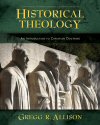
Most historical theology texts follow Christian beliefs chronologically, discussing notable doctrinal developments for all areas of theology according to their historical appearance. And while this may be good history, it can make for confusing theology, with the classic theological loci scattered throughout various time periods, movements, and controversies.
In Historical Theology, Gregg Allison offers students the opportunity to study the historical development of theology according to a topical-chronological arrangement, setting out the history of Christian doctrine one theological element at a time. Such an approach allows readers to concentrate on one tenet of Christianity and its formulation in the early church, through the Middle Ages, Reformation, and post-Reformation era, and into the modern period. The text includes a generous mix of primary source material as well, citing the words of Cyprian, Augustine, Aquinas, Luther, Calvin, Barth, and others. Allison references the most accessible editions of these notable theologians’ work so that readers can continue their study of historical theology through Christian history’s most important contributors. Historical Theology is a superb resource for those familiar with Wayne Grudem’s Systematic Theology or interested in understanding the development of Christian theology.
Gregg Allison is Professor of Theology at the Southern Baptist Theological Seminary and is a recognized expert on Catholicism and historical theology.
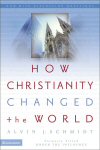
Western civilization is becoming increasingly pluralistic, secularized, and biblically illiterate. Many people today have little sense of how their lives have benefited from Christianity’s influence, often viewing the church with hostility or resentment. How Christianity Changed the World is a topically arranged Christian history for Christians and non- Christians.
Grounded in solid research and written in a popular style, this book is both a helpful apologetic tool in talking with unbelievers and a source of evidence for why Christianity deserves credit for many of the humane, social, scientific, and cultural advances in the Western world in the last two thousand years. Photographs, timelines, and charts enhance each chapter. This edition features questions for reflection and discussion for each chapter.
Honest and realistic . . . a fascinating inspirational experience.
—David O. Moberg, Professor Emeritus of Sociology, Marquette University
Alvin J. Schmidt (PhD, University of Nebraska) retired in 1999 as Professor of Sociology at Illinois College in Jacksonville, Illinois, where he still lives. He is the author of several books, including The Great Divide: The Failure of Islam and the Triumph of the West, and served as a consulting editor for Dictionary of Cults, Sects, Religions and the Occult.
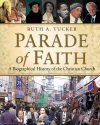
Part storybook, part textbook, part historical overview, Parade of Faith presents the history of Christianity in riveting fashion. Ruth Tucker adopts the metaphor of a parade, journey, or pilgrimage to explore the history of Christianity, which began as the Messiah marched out of the pages of the Old Testament and will end one day when “the saints go marching in” to the New Jerusalem. The book is divided into two chronological groupings: first, the advent of Christianity until the German and Swiss Reformations; second, the Anabaptist movement and Catholic Reformation until the present-day worldwide expansion of the church. Yet, ultimately the topic matter is not movements, dates, or a stream of facts, but instead people—people who still have stories to tell other Christians. And with a little help from clues to their own contexts, they can still speak clearly today.
This book is laid out systematically to showcase the biographies of such prominent figures within their historical settings. The pages are peppered with historical “what if” questions, explorations of relevant topics for today, personal reflections, illustrations, and lists for further reading. Parade of Faith is an excellent introduction for undergraduate students and interested lay readers.
Ruth Tucker is one of the finest storytelling teachers and writers I know.
—Scot McKnight, Karl A. Olsson Professor in Religious Studies, North Park University
Church history at its best—a must for ministers and lay people alike.
—Hutz Hertzberg, Executive Pastor, The Moody Church
The reputation of Tucker as a masterful storyteller is well known.
—Larry Lindquist, Professor, Denver Seminary
Ruth A. Tucker (PhD, Northern Illinois University) has taught mission studies and church history at Trinity Evangelical Divinity School and Calvin Theological Seminary. She is the author of dozens of articles and eighteen books.
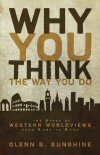
People often talk about worldview when describing the philosophy that guides their lives. But how have we come by our worldviews, and what impact did Christianity have on those that are common to Western civilization? This authoritative, accessible survey traces the development of the worldviews that underpin the Western world. It demonstrates the decisive impact that the growth of Christianity had in transforming the outlook of pagan Roman culture into one that, based on biblical concepts of humanity and its relationship with God, established virtually all the positive aspects of Western civilization.
The two-pronged assault in our time on the biblically based worldview by postmodern philosophy and the writings of neo-atheists has made it even more crucial that we acknowledge and defend its historical roots. Unique among books on the topic, this work discusses Western worldviews as a continuous narrative rather than as simply a catalogue of ideas, and traces the effects these changes in worldview had on society. It helps readers understand their own worldviews and those of other people and helps them recognize the consequences that worldviews hold. Professors, students, and armchair historians alike will profit from this book.
This book shows how much of an impact the biblical worldview can have in transforming society. If we follow the example of those who have gone before us in learning to think biblically and to live out the full implications of the gospel, we can have the same impact on our world today. I highly recommend this book.
—From the foreword by Chuck W. Colson
Glenn S. Sunshine (PhD University of Wisconsin) is Professor of History at the Central Connecticut State University and a faculty member of the Centurions Program at Breakpoint, the worldview training ministry of Prison Fellowship Ministries. Previously, he taught at Calvin College and was a visiting professor at the Universität der Bundeswehr-Hamburg (now Helmut Schmidt University) in Germany. He is the author of The Reformation for Armchair Theologians and Reforming French Protestantism, and contributor to the Oxford Encyclopedia of the Reformation and the Encyclopedia of Protestantism.
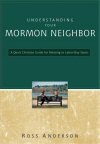
More than a belief system, Mormonism is a cultural identity that shapes the worldview, values, and lifestyles of those involved in the Church of Jesus Christ of Latter-day Saints. In Understanding Your Mormon Neighbor, Ross Anderson seeks to help Christians relate to Latter-day Saints by giving insights into Mormon life and culture. Anderson’s work is supported both by his lifetime of experiences growing up Mormon and by current research that utilizes many Latter-day Saints’ own sources.
This volume explains the core stories that form the Mormon worldview, shares the experiences that shape the community identity of Mormonism, and shows how Mormons understand truth. Anderson shares how most Mormons see themselves and others around them, illuminating why people join the LDS Church and why many eventually leave. Latter-day Saints will find the descriptions of their values, practices, and experiences both credible and familiar. Understanding Your Mormon Neighbor suggests how Christians can befriend Latter-day Saints with confidence and sensitivity and share the grace of God wisely within their relationships. Anderson includes discussion questions for individuals and small groups, black and white photographs and charts, and an appendix that includes “Are Mormons Christians?” and “Should I Vote for a Mormon?”
Ross Anderson (DMin, Salt Lake Seminary) is the founding pastor of Wasatch Evangelical Free Church in Roy, Utah, where he served for twenty-eight years. He is currently a teaching pastor at Alpine Community Church, a multi-site congregation in northern Utah, and Director of Utah Advance Ministries. He was born in Utah and raised in California as an active member of the Mormon (Latter-day Saint) Church. His passions including planting culturally appropriate churches in Utah and incorporating former Mormons into the local church.
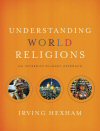
Globalization and high-speed communication put twenty-first century people in contact with adherents to a wide variety of world religions, but usually, valuable knowledge of these other traditions is limited at best. On the one hand, religious stereotypes abound, hampering a serious exploration of unfamiliar philosophies and practices. On the other hand, the popular idea that all religions lead to the same God or the same moral life fails to account for the distinctive origins and radically different teachings found across the world’s many religions.
Understanding World Religions presents religion as a complex and intriguing matrix of history, philosophy, culture, beliefs, and practices. Hexham believes that a certain degree of objectivity and critique is inherent in the study of religion, and he guides readers in responsible ways of carrying this out. Of particular importance is Hexham’s decision to explore African religions, which have frequently been absent from major religion texts. He surveys these in addition to varieties of Hinduism, Buddhism, Judaism, Christianity, and Islam.
An ideal, clear, and lively introduction to world religions for North American students that also briefly deals with their modern developments, e.g. in the field Buddhism.
—Michael Hahn, Professor of Indology and Tibetology, Philipps-University, Marburg, Germany
A book that goes beyond mere description to engage real, and often controversial, issues. All university teachers grappling with these issues will find it of great use. Unlike most texts of this nature, it has an extensive section on African traditions that ought to interest scholars teaching African politics. It is a highly commendable piece of work.
—Henry Srebrnik, Professor of Political Studies, University of Prince Edward Island
Hexham offers an introduction to the study or religion based on his years of teaching the subject, an impressive multi-cultural knowledge of various religious traditions, and in a style that is readable and engaging. Not another boring catalogue of religious beliefs and practices looked at from a pseudosophisticated afar, Hexham’s book convey something of the diversity and controversies involved in the academic study of religions.
—Larry Hurtado, Professor and Director of the Center for the Study of Christian Origins, The University of Edinburgh
Many Western presentations of Islam merely pass on selected remarks from unreliable tertiary sources. Irving Hexham’s chapters on Islam are unique in that they reach beyond library versions, Muslim polemic, and Western politically correct advocacy to the actual discourse of devoted Muslims around the world today. Hexham takes seriously the sourcebooks through which Muslims understand their faith and practice, and the perspectives of recent authors whose influence shapes modern Muslim views. He rightly relies on some of the strongest scholarly studies of Islam for his analysis and evaluation, which sheds light on a subject that remains confusing for many Westerners.
—Gordon Nickel, author of Narratives of Tampering in the Earliest Commentaries on the Qur’an
I enjoyed the chapters on Indian religions enormously. They are enlightening and fascinating for anyone who has brushed the surface of India and its religious traditions. The author has produced a work that is very readable and thought-provoking, but more importantly, one that brings the religions to life in a practical way.
—Bill Warden, Canadian Ambassador to Pakistan (1981–1983)
Irving Hexham is Professor of Religious Studies at the University of Calgary and Adjunct Professor of World Christianity at Liverpool Hope University. He has published twenty-seven academic books, including The Concise Dictionary of Religion, Understanding Cults and New Religions, and Religion and Economic Thought, plus eighty major academic articles and chapters in books, numerous popular articles, and book reviews.
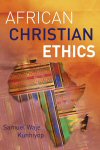
African Christian Ethics is required reading for anyone seeking an overview of burning ethical issues in Africa and practical suggestion on how to address them. The book is divided into two parts. The first part deals with the theory of ethics, while the second discusses practical issues. The issues are grouped into the following six sections:
- Socio-Political Issues
- Financial Issues
- Marriage Issues
- Sexual Issues
- Medical Issues
- Religious Issues
Each section begins with a brief general introduction, followed by the chapters dealing with specific issues in that area. Each chapter begins with an introduction, discusses traditional African thinking on the issue, presents an analysis of relevant biblical material, and concludes with some recommendations. There are questions at the end of each chapter for discussion or personal reflection, often asking students to reflect on how the discussion in the chapter applies to their ministry situation.
Dr. Kunhiyop combines a broad knowledge of African and Western moral traditions with sound biblical scholarship and critical analysis. He thus writes with deep conviction, moral confidence, and authority.
—Yusufu Turaki, Professor of Theology and Social Ethics, Jos ECWA Theological Seminary (JETS), Nigeria
Samuel Waje Kunhiyop is Head of the Postgraduate School, South African Theological Seminary. He was previously the Provost and Professor of Theology and Ethics at Jos ECWA Theological Seminary (JETS). He holds a BA (JETS), MAET (Western Seminary, Portland, Oregon), and PhD (Trinity International University, Illinois). He is also an ordained minister with the Evangelical Church of West Africa (ECWA).
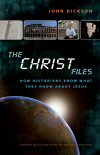
Uniquely among the world’s religions, the central claims of Christianity concern not just timeless spiritual truths, but tangible historical events. At the heart of the of the Christian faith are things that are meant to have happened in Palestine between 5 BC and AD 30. It’s as if Christianity happily places its head on the chopping block of public scrutiny and invites anyone who wants to come and take a swing. Some of Christianity’s claims are so spectacular that they provoke a firestorm of questions, scrutiny, debate, and misinformation whenever they are discussed.
The popularity of The Da Vinci Code and the frequent airing of TV documentaries delving into the darker uncertainties of Christianity show that such skepticism flourishes in the Western world today. In The Christ Files you will learn how historians know what they know about Jesus. Historian John Dickson embraces the need to examine Christianity’s claims in the light of history, opening readers to a wealth of ancient sources and explaining how mainstream scholars—whether or not they claim Christian faith personally—reach their conclusions.
Christianity arrived on the historical scene at a time of great literary activity. While many texts penned by ancient philosophers, historians, poets, and playwrights can reliably inform us about Jesus himself and about the culture in which he lived, others are not so credible. Dickson skillfully highlights both types of sources along with the historical methods used to study Christianity’s claims. He also shows how historians assess the reliability of available data, and provides an honest but informed perspective on where historical issues are clear-cut and where personal faith comes into play. The Christ Files is a must-read for those looking to expand their understanding of early Christianity and the life of Jesus.
The Christ Files offers a wealth of knowledge of the key issues and interviews with key scholars answering key controversial questions about Jesus: Gnostics, the first century Judaism of Jesus, how oral tradition operated in the background, and archaeology. John Dickson is a skilled guide. These “files” are loaded with information that is fascinating and accessible. Open the drawer and enjoy.
—Darrell Bock, Research Professor of New Testament Studies, Dallas Theological Seminary
In a world of many books about the historical Jesus, there are very few which summarize the historical evidence, Greco-Roman, Jewish, and Christian, as well and as succinctly as John Dickson does in The Christ Files. . . . In an increasingly less Christian world, here is some first rate historical detective work that provides effective presentation without apologizing for the New Testament evidence. Highly recommended.
—Ben Witherington III, Amos Professor of New Testament for Doctoral Studies, Asbury Theological Seminary
This attractive book is concerned not so much to tell us what can be known about the life of Jesus as rather to help people who want to know how to evaluate by strictly historical methods the conclusions set forth by contemporary writers who present bizarre reconstructions of him and to see how professional ancient historians give us a firm basis for accepting the New Testament documents as reliable sources for what he did and taught. This is a sober, well-informed guide based on sound scholarship.
—I. Howard Marshall, Professor Emeritus of New Testament, University of Aberdeen
John Dickson . . . has demonstrated his ability to write both at the most sophisticated technical level for fellow New Testament professionals and for the average-level reader with little knowledge of the Bible—and for people virtually anywhere in between. This slim volume aims . . . to correct popular misconceptions about what historians do and don’t know . . . But don’t be misled by the book’s simplicity and clarity; it is based on wide-ranging knowledge of the field and on the finest and most cutting-edge scholarship.
—Craig L. Blomberg, Distinguished Professor of New Testament, Denver Seminary
There is a huge need for intelligent scholarship to be effectively communicated beyond the academy, a role that Dickson fulfills brilliantly. Informed by scholarship, yet highly readable on a nontechnical level, this work is a very useful introduction to historical discussion about Jesus.
—Craig Keener, Professor of New Testament, Palmer Seminary of Eastern University
Confusion about the historical Jesus is epidemic today. Here John Dickson clears the fog and explains with scholarly acumen and compelling arguments precisely how we know what we know about Jesus. In one stroke, he combines first rate scholarship with a clarity found among only the best teachers. This is the book I’ll recommend to my students for years to come.
—Gary M. Burge, Professor of New Testament, Wheaton College & Graduate School
Finally, an honest response to sensationalized stories about the life of Jesus. Dickson addresses with refreshing directness the real questions about Jesus’ life and death and examines a sweeping collection of sources in providing full and fair answers.
—Lynn Cohick, Associate Professor of New Testament, Wheaton College and Graduate School
There are many excellent books on the historical Jesus, but few written with the same clarity and balance as John Dickson’s The Christ Files. . . . Dickson writes like a journalist, gently guiding readers through the maze of essential questions in the search for the real Jesus. Skeptic and believer alike will find Dickson’s approach and cautious conclusions a breath of fresh air in a debate too often characterized by sensationalistic, headline-catching claims on the one side and fundamentalist naivety on the other.
—Mark L. Strauss, Professor of New Testament, Bethel Seminary
John Dickson (PhD, Macquarie University, Sydney) is Senior Research Fellow of the Department of Ancient History, Macquarie University; Co-director of the Centre for Public Christianity; and Senior Minister at St. Andrew’s Roseville. The author of more than a dozen books, he is the host of two major historical documentaries for Australian television and is a busy public speaker in corporations, universities, churches, and conferences.
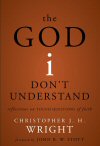
If we are honest, we have to admit that there are many things we don’t understand about God. We do not have final answers to the deep problems of life, and those who say they do are probably living in some degree of delusion. There are areas of mystery in our Christian faith that lie beyond the keenest scholarship or even the most profound spiritual exercises. For many people, these problems raise so many questions and uncertainties that faith itself becomes a struggle, and the very person and character of God are called into question.
Chris Wright encourages us to face up to the limitations of our understanding and to acknowledge the pain and grief they can often cause. But at the same time, he wants us to be able to say, like the psalmist in Psalm 73: “But that’s all right. God is ultimately in charge and I can trust him to put things right. Meanwhile, I will stay near to my God, make him my refuge, and go on telling of his deeds.”
It is because Dr. Wright confronts biblical problems with a combination of honesty and humility that I warmly commend this book.
—John R. W. Stott, Rector Emeritus, All Souls Church
Christopher J. H. Wright is International Director of the Langham Partnership International. He also serves as Chair of the Lausanne Movement’s Theology Working Group and Chair of the Theological Resource Panel of TEAR Fund, a leading Christian relief and development charity. He has written several books, including Living as the People of God, God’s People in God’s Land, Knowing Jesus through the Old Testament, Walking in the Ways of the Lord, Deuteronomy in the New International Biblical Commentary, The Message of Ezekiel in the Bible Speaks Today series, Old Testament Ethics for the People of God, The Mission of God, and The God I Don’t Understand.
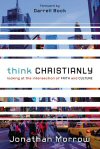
Think Christianly is about seizing the opportunities we have every day to speak the life Jesus offers into our culture. Tragically, many such opportunities pass us by unclaimed—either because we don’t notice them or we have not prepared ourselves to enter into them. And those around us seem to grow increasingly unwilling to hear anything the church has to say.
Jonathan Morrow helps church leaders envision and implement ways for their congregations to “think Christianly” about contemporary questions and to speak in informed, engaging ways. Morrow explores many of the important issues that Christians often hear raised with regard to faith—questions about who Jesus was, the good and bad of religion, pain and evil in the world, the reliability of the Bible, sexuality and intimate relationships, and hope for change, among others. The life and faith issues that Think Christianly addresses lead to cultural moments where Christianity and contemporary culture intersect. This book will help churches take vital steps toward cultivating compassion and competence in speaking faithfully to a questioning world.
As someone who has devoted many years of ministry to teaching Christian worldview, I am thrilled to see dynamic and faithful worldview leaders like Jonathan Morrow stepping to the fore. Think Christianly, in a compelling and accessible way, equips Christians young and old to engage the culture winsomely, intelligently, and confidently.
—Chuck Colson, Founder, Colson Center for Christian Worldview
Jonathan Morrow is the author of Welcome to College: A Christ-follower’s Guide for the Journey and co-wrote (with Sean McDowell) Is God Just a Human Invention? He graduated with a MDiv and an MA from Talbot School of Theology and serves as the equipping pastor at Fellowship Bible Church in Murfreesboro, TN.
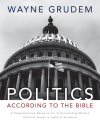
A variety of perspectives exist within the Christian community when it comes to political issues and political involvement. This comprehensive and readable book presents a political philosophy from the perspective that the Gospel pertains to all of life so Christians should be involved in political issues. In brief, this is an analysis of conservative and liberal plans to do good for the nation, evaluated in light of the Bible and common sense. In this ground-breaking book, recognized evangelical Bible professor Wayne Grudem rejects five mistaken views about Christian influence on politics:
- “Compel religion”
- “Exclude religion”
- “All government is demonic”
- “Do evangel-ism, not politics”
- “Do politics, not evangelism”
He proposes a better alternative: “significant Christian influence on government.” Then he explains the Bible’s teachings about the purpose of civil government and the characteristics of good or bad government. Does the Bible support some form of democracy? Should judges and the courts hold the ultimate power in a nation? With respect to specific political issues, Grudem argues that most people’s political views depend on deep-seated assumptions about several basic moral and even theological questions, such as whether God exists, whether absolute moral standards can be known, whether there is good and evil in each person’s heart, whether people should be accountable for their good and bad choices, whether property should belong to individuals or to society, and whether the purpose of the earth’s resources is to bring benefit to mankind.
After addressing these foundational questions, Grudem provides a thoughtful, carefully-reasoned analysis of over fifty specific issues dealing with the protection of life, marriage, the family and children, economic issues and taxation, the environment, national defense, relationships to other nations, freedom of speech and religion, quotas, and special interests. He makes frequent application to the current policies of the Democratic and Republican parties in the United States, but the principles discussed here are relevant for any nation.
A wonderful resource as we face growing tensions from an ever more powerful state.
—Chuck Colson, Founder, Colson Center for Christian Worldview
Grudem’s biblically-based good sense overwhelms the nostrums of . . . evangelical left.
—Marvin Olasky, Editor-in-chief, World
Precisely and exactly the call the rising generation needs to hear.
—Timothy Goeglein, Vice President, External Relations, Focus on the Family
Wayne Grudem is Research Professor of Theology and Biblical Studies at Phoenix Seminary in Phoenix, Arizona. He holds degrees from Harvard (AB), Westminster Theological Seminary (MDiv, DD), and Cambridge (PhD). He is the author of more than a dozen books including the bestselling Systematic Theology.
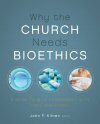
In a world where incredible medical technologies are possible does “can do” mean “should do”? Why the Church Needs Bioethics helps you understand and constructively engage bioethical challenges with the resources of Christian wisdom and ministry. Three rich and true-to-life case studies illustrate the urgency of such bioethical issues as reproductive and genetic technologies, abortion, forgoing treatment, assisted suicide, stem cell research, and human enhancement technologies. Leading Christian voices bring biblical and theological perspective to bear on the incredible medical technologies available today; mobilize useful insights from health care, law, and business; and demonstrate the powerful ways the church can make a difference through counseling, pastoral care, intercultural ministry, preaching, and education.
This book equips students, church and lay leaders, and people in health-related fields with the knowledge to make faithful bioethical decisions and to help foster a world where human beings are shown respect as people created in the image of God. Contributors to Why the Church Needs Bioethics include leading Bible and theology scholars, such as D. A. Carson and Kevin Vanhoozer; leaders in the areas of preaching (Greg Scharf) and ethics (Scott Rae); and fifteen other experts in the fields of biblical-theological studies, ministry, communication, business, law, healthcare, and bioethics.
John F. Kilner (PhD, Harvard) is Franklin Forman Chair of Ethics, Professor of Bioethics and Contemporary Culture, and Director of Bioethics Programs at Trinity International University in Deerfield, Illinois. The author or editor of twenty books, Dr. Kilner served as President and CEO of The Center for Bioethics and Human Dignity in Bannockburn, Illinois from 1994–2005.
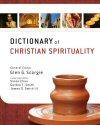
In recent decades Christian spirituality, spiritual formation, and spiritual theology have become important concepts in the global evangelical community. Consequently, an accessible and reliable academic resource is needed on these topics—one that will offer a discerning orientation to the wealth of ecumenical resources available while still highlighting the distinct heritage and affirming the core grace-centered values of classic evangelical spirituality.
The Dictionary of Christian Spirituality reflects an overarching interpretive framework for evangelical spiritual formation: a holistic and grace-filled spirituality that encompasses relational (connecting), transformational (becoming), and vocational (doing) dynamics. At the same time, contributors respectfully acknowledge the differences between Reformed, Holiness, and Pentecostal paradigms of the spiritual life. And, by bringing together writers from around the world who share a common orthodoxy, this reference work is truly global and international in both its topical scope and contributors.
Entries give appropriate attention to concepts, concerns, and formative figures in the evangelical tradition of spirituality that other reference works neglect. They offer a discerning orientation to the wealth of ecumenical resources available, exploring the similarities and differences between Christianity and alternate spiritualities without lapsing into relativism. The Dictionary of Christian Spirituality is a resource that covers a wide range of topics relating to Christian spirituality and is biblically engaged, accessible, and relevant for all contemporary Christians.
The very publication of this work speaks to the contemporary interest in spirituality. So much spirituality, however, is uninformed, shallow, and vague. All the more reason to welcome this important dictionary. It is impressive in its scope, wide in what is included, and deep in the intent to strengthen life in the Spirit of Christ. Scan a few entries, and it will be evident what a valuable resource this can be.
—Leighton Ford, President, Leighton Ford Ministries
The combination of substantial reflective essays on major themes in Christian spirituality and sharply focused articles on major figures and topics provides a rich mixture of insight, information, and inspiration. ‘Spirituality’ can be a subject that wafts into the ether, but in this broadly ecumenical and very well-balanced work, it is presented with real substance and genuine edification.
—Mark A. Noll, Professor of History, University of Notre Dame
The Dictionary of Christian Spirituality is a well-researched, comprehensive study of Christian spirituality from a broad evangelical perspective. . . . I give the Dictionary of Christian Spirituality my highest recommendation.
—Richard J. Foster, Professor of Theology, Friends University
Engaging, comprehensive, informative, broad in perspective. Who thinks it is fun to read a dictionary? This one is! This is a dictionary to be read for enjoyment as well as information. The essays and articles are freshly written, thorough but concise. The Dictionary of Christian Spirituality reflects the deep respect and appreciation the writers have for their topics. Reading this dictionary is like taking a finely tuned course in the topics included. . . . I was fascinated and drawn from article to article . . . appreciating the fine scholarship, depth of research reflected, and careful writing that make the Dictionary of Christian Spirituality an excellent resource.
—Jeannette A. Bakke, Faculty Associate, Bethel Theological Seminary
This is not the only dictionary about Christian spirituality in town. There are many around and some of them are very good. But this one, with its global interests and spiritual zeal, has an energy and breadth that lifts it into a new league. Moreover, as well as making a very good job of expanding our knowledge of Christian spirituality and all the sources that have shaped it, this important volume steers the reader through the people, movements, and issues with a reliable, generous, and grace-focused wisdom. It is a source not just of information about Christian spirituality but of real formation, through the Spirit, in the life of Christ.
—Christopher Cocksworth, Bishop of Coventry, Church of England
The more I read in the Dictionary of Christian Spirituality, the more I wanted to read more! The initial essays provide a thoroughly excellent foundation, and the alphabetized entries that follow leave us intrigued to read others. I highly recommend this dictionary for all Christians, especially those who want to grow in their active practices of various spiritual disciplines, their devoted love for God and neighbor, and their fervent thanksgiving for global saints and the myriad ways God works in the world.
—Marva J. Dawn, Teaching Fellow in Spiritual Theology, Regent College
Scholarship with a soul! This is a book like no other—scholarly breadth with spiritual depth in a dictionary. So many have written so much about Christian spirituality that it is difficult to connect the parts. Here is a readable resource that brings everything together. I kept turning the pages . . . not to read through, but to explore. Every article led me to another journey on a different page.
—Leith Anderson, President, National Association of Evangelicals
The Dictionary of Christian Spirituality is a remarkable balance of broad, integrative essays and more than 700 succinct, informative dictionary entries. It combines a wide survey of the great movements in Christian spirituality while giving attention to the main contributors from all parts of the globe, past and present. The contributors include some of the great heavyweights of the movement while also incorporating significant voices from a variety of related disciplines and perspectives. The work is a must-have resource for every able scholar, pastor, and follower of Jesus.
—Gayle D. Beebe, President, Westmont College
Glen G. Scorgie (PhD, St. Andrews) is Professor of Theology at Bethel Seminary San Diego since 1996. Previously he was Academic Vice-President of North American Baptist College in Edmonton, Alberta, Canada, and is a past president of the Canadian Evangelical Theological Association. For the past decade he has also been involved in the ministries of Chinese Bible Church of San Diego, and lectures regularly in Asia.
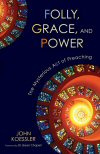
When you stand before your congregation, what do you hope to accomplish when you preach the Word? If people have Bibles and the freedom to read and pray on their own—why do they need you? In short, what do you bring to the table?
Author, Pastor, and Professor John Koessler answers those questions and many more. Why does one sermon have a powerful effect on the audience while another falls flat? Why should listeners heed what the preacher says? Is human language adequate for facilitating an encounter with God? What is the point of preaching a sermon? Folly, Grace, and Power is a must-read for pastors, seminarians, and lay leaders charged with the task of preaching God’s word. This essential book is both a stern reminder of the sacredness of the awesome “job” of being a preacher, as well as a how-to that reveals the key to speaking powerfully on God’s behalf.
John Koessler has written an inspiring and responsible theological reflection on the proclamation of the Word. This book is full of meaty insights. Preaching is an exercise not just in communication but also in incarnation. Indeed, Koessler challenges us with the inspiring and sobering truth that to preach is to prepare others for eternity.
—Chris Brauns, Pastor, The Red Brick Church
Whether you are a seasoned preacher or just getting started, if you care about being an effective preacher, this book is a must-read for you.
—Joseph M. Stowell, President, Cornerstone University
John Koessler has written for Discipleship Journal, Leadership, Moody Magazine, Decision, and Christianity Today. He has served as a pastor and currently is Chair of the Pastoral Studies Department at Moody Bible Institute in Chicago. He is the author of several books including True Discipleship and God Our Father. He holds degrees from Wayne State University, Biblical Theological Seminary, and Trinity Evangelical Divinity School.
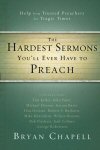
Cancer. Suicide. The death of a child. As much as we wish we could avoid tragedies like these, eventually they will strike your church community. When they do, pastors must be ready to offer help by communicating the life-changing message of the gospel in a way that offers hope, truth, and encouragement during these difficult circumstances. Those asked to preach in the midst of tragedy know the anxiety of trying to say appropriate things from God’s Word that will comfort and strengthen God’s people when emotions and faith are stretched thin. This indispensable resource helps pastors prepare sermons in the face of tragedies by providing suggestions for how to approach different kinds of tragedy, as well as insight into how to handle the theological challenges of human suffering.
Each topic provides a specific description of the context of the tragedy, the key concerns that need to be addressed in the message, and an outline of the approach taken in the sample sermon that follows. Topics addressed include:
- Abortion
- Abuse
- Responding to national and community tragedies
- The death of a child
- Death due to cancer and prolonged sickness
- Death due to drunk driving; drug abuse
- Suicide
Bryan Chapell, author of Christ-Centered Preaching, has gathered together messages from some of today’s most trusted Christian leaders including: John Piper, Tim Keller, Michael Horton, Jack Collins, Dan Doriani, Jerram Barrs, Mike Khandjian, Robert Rayburn, Wilson Benton, Bob Flayhart, and George Robertson. Each chapter provides you with the resources you need to communicate the life-giving hope of the gospel in the midst of tragedy. In addition, the appendices provide further suggestions of biblical texts for addressing various subjects as well as guidance for conducting funerals.
Bryan Chapell is the bestselling author of numerous books on Christian ministry and life. Christ-Centered Preaching and Christ-Centered Worship are standard seminary texts; Holiness by Grace, Each for the Other, and Praying Backwards have helped thousands find greater joy and fulfillment in the grace of Christ. He is distinguished professor of preaching at Knox Theological Seminary.
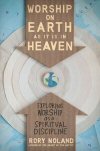
Despite the prevalence of worship pastors and the popularity of worship pastors and the popularity of worship music, Christians of all varieties still struggle to understand and experience vibrant connection to God through worship. The fast pace of everyday life and ongoing “worship wars” challenge believers’ ability to slow down and focus on God’s goodness and sovereignty and to experience the blessings genuine worship can bring to their daily lives.
This book provides a practical perspective on the Christian discipline of worship, mining the Bible for wisdom on how to worship God. Author Rory Noland addresses both individual and corporate worship, relating biblical teaching to everyday issues Christians face in their personal faith and church life. Discussion questions and action points encourage readers to step by faith into God’s presence and “worship on earth as it is in heaven.”
This book includes:
- Slice-of-church-life scenarios: every chapter begins with a brief scenario that presents a worship-related issue or a conflict corresponding to the chapter topic
- Group discussion questions: based on the opening scenario, these questions help readers think about and discuss worship-related topics from different perspectives
- Issue-by-issue practical guidance from a biblical perspective
- “Ponder and Apply” application questions: each chapter ends with a series of discussion questions and action steps to help readers identify key insights and make personal applications
Rory Noland is the director of Heart of the Artist Ministries, an organization dedicated to serving artists in the church. A songwriter, speaker, church leader, and consultant, Rory is also the author of three books: The Heart of the Artist: A Character-Building Guide For You and Your Ministry Team, Thriving as an Artist in the Church: Hope and Help For You and Your Ministry Team, and The Worshiping Artist: Equipping You and Your Ministry Team to Lead Others in Worship. Rory currently serves part-time as Pastor of Worship at Harvest Bible Chapel in Rolling Meadows, Illinois, contributes regularly to Worship Leader magazine, and also leads worship for the Transforming Center, a ministry that cares for the souls of pastors and leaders. Rory graduated from the Chicago Musical College at Roosevelt University with a degree in theory and composition and served as the music director at Willow Creek Community Church in South Barrington, Illinois.